
AIPs
Aptos Improvement Proposals (AIPs)
Stars: 140
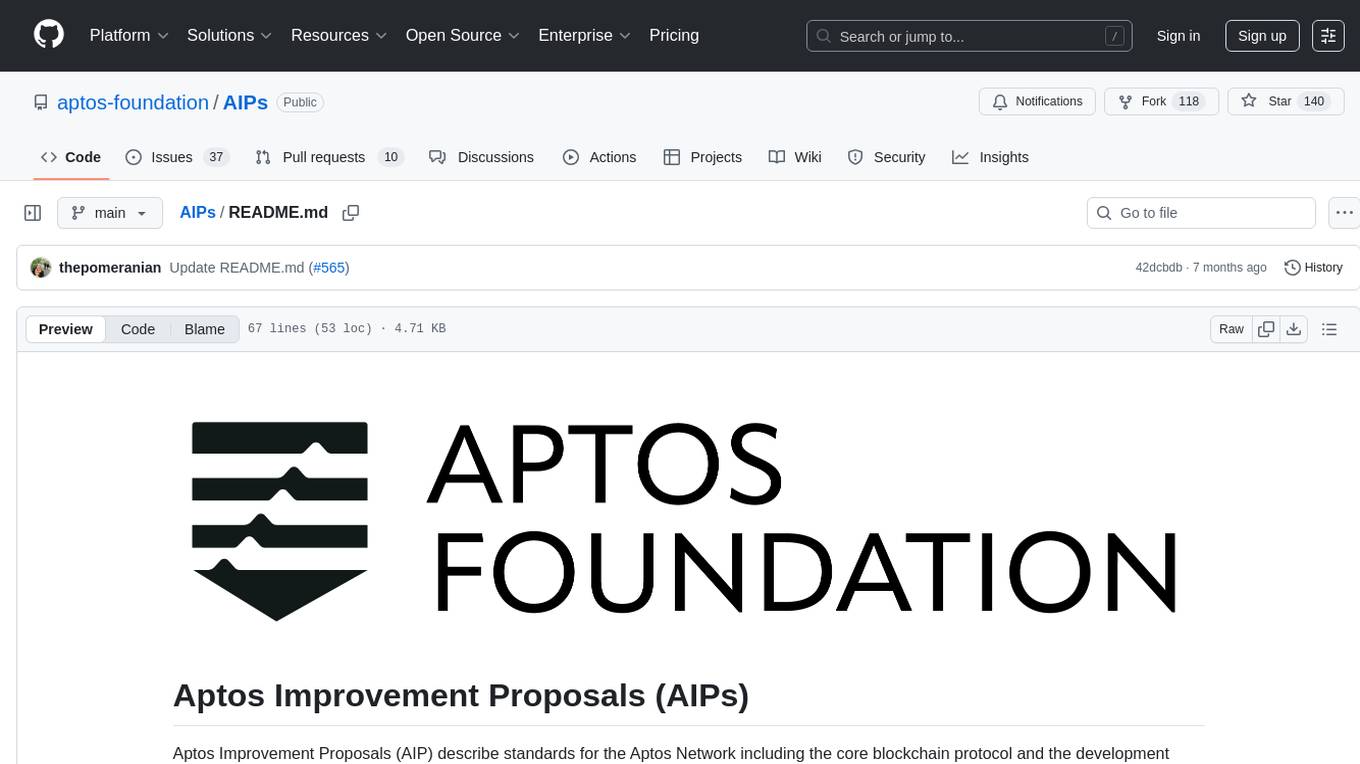
Aptos Improvement Proposals (AIP) describe standards for the Aptos Network including the core blockchain protocol and the development platform (Move), smart contracts and systems for smart contract verification, standards for the deployment and operation of the Aptos Network, APIs for accessing the Aptos Network and processing information from the Aptos Network. AIPs are intended to cover changes that impact active services within the Aptos ecosystem. The AIP issue tracker can be used to store exploratory proposals. To submit an AIP, users need to fork the repository, copy the template file, edit the AIP file, commit changes, and submit a pull request. AIPs are categorized as Standard and Informational, with different statuses like Draft, In Review, Ready for Approval, Accepted, Rejected, and On Hold. Users can provide feedback on AIPs by following discussions, evaluating communication clarity, and understanding the impact on the community.
README:
Aptos Improvement Proposals (AIP) describe standards for the Aptos Network including the core blockchain protocol and the development platform (Move), smart contracts and systems for smart contract verification, standards for the deployment and operation of the Aptos Network, APIs for accessing the Aptos Network and processing information from the Aptos Network.
AIPs are intended to cover changes that impact active services within the Aptos ecosystem. In lieu of another medium for posting community proposals, the AIP issue tracker can be used to store exploratory proposals. Though please consider first whether or not the Aptos-Core may be a better location for such discussions.
To vote on AIPs impacting the state of the Blockchain, go to https://governance.aptosfoundation.org/.
- Fork this repo into your own GitHub
- Copy
TEMPLATE.mdinto your new AIP file inaips/<your-feature-name-NO-AIP-#-here>.md- Name your AIP file based on your feature, not the AIP number, which will be picked for your later.
- e.g.,
new-zero-knowledge-range-proof-verifiers.mdis a good name.
- ...but
aip-14.mdor14.mdis NOT a good name.
- Edit your AIP file
- Fill in the YAML header (see instructions there)
- Follow the template guidelines to the best of your ability
- Commit these changes to your repo
- Submit a pull request on GitHub to this repo.
- To start discussing your AIP, create a GH Issue for your AIP using the default Issue template
Note: This is a subset of all the AIPs -- to see the full list of AIPs, please click here.
| Number | Category | Title | Author |
|---|---|---|---|
| AIP-109 | Framework | Hide Unwanted Soulbound Objects | gregnazario |
| AIP-110 | Governance | Lower the Threshold for Passing a Governance Proposal from 400M APT to 300M APT | sherry-x |
| AIP-111 | Blockchain | Transaction Execution Replay Backward Compatibility Policy | sherry-x |
| AIP-112 | Standard Language | Function Values in the Move VM | Wolfgang Grieskamp |
| AIP-113 | Framework | Domain-based Account Abstraction | igor-aptos, lightmark |
| AIP-114 | Framework | Increase Coin Symbol Byte Length | gregnazario |
| ... | ... |
- Standard: AIPs focusing on the changes to the Aptos blockchain.
- Informational: AIPs for the purpose of providing additional information, context, supporting details about Aptos blockchain.
| Status | Description |
|---|---|
Draft |
Drafts are currently in process and not ready for review. No corresponding GH Issue will be created. |
In Review |
AIPs are ready for community review and feedback. See suggestions on providing feedback below. |
Ready for Approval |
AIPs are ready for Gatekeeper approval and feedback. |
Accepted |
AIPs has been accepted and will be implemented soon. |
Rejected |
A community decision has been made to not move forward with an AIP at this time. |
On Hold |
Some information is missing or prerequisites have not yet been completed. |
- Framework
- Core (Blockchain)
- Gas
- Cryptography
- Ecosystem
- Follow the discussion in the corresponding AIP issue
- If you were designing this change, what would you want to communicate? Is it being communicated in the AIP?
- As a community member, how are you impacted by this change? Does it provide enough information about the design and implementation details to assist with decision making?
- If an AIP Author is not actively engaging in their PR's and Issues, they will be closed after 14 days due to inactivity.
- If an AIP has been rejected, please review the feedback provided for further guidance.
For Tasks:
Click tags to check more tools for each tasksFor Jobs:
Alternative AI tools for AIPs
Similar Open Source Tools

AIPs
Aptos Improvement Proposals (AIP) describe standards for the Aptos Network including the core blockchain protocol and the development platform (Move), smart contracts and systems for smart contract verification, standards for the deployment and operation of the Aptos Network, APIs for accessing the Aptos Network and processing information from the Aptos Network. AIPs are intended to cover changes that impact active services within the Aptos ecosystem. The AIP issue tracker can be used to store exploratory proposals. To submit an AIP, users need to fork the repository, copy the template file, edit the AIP file, commit changes, and submit a pull request. AIPs are categorized as Standard and Informational, with different statuses like Draft, In Review, Ready for Approval, Accepted, Rejected, and On Hold. Users can provide feedback on AIPs by following discussions, evaluating communication clarity, and understanding the impact on the community.
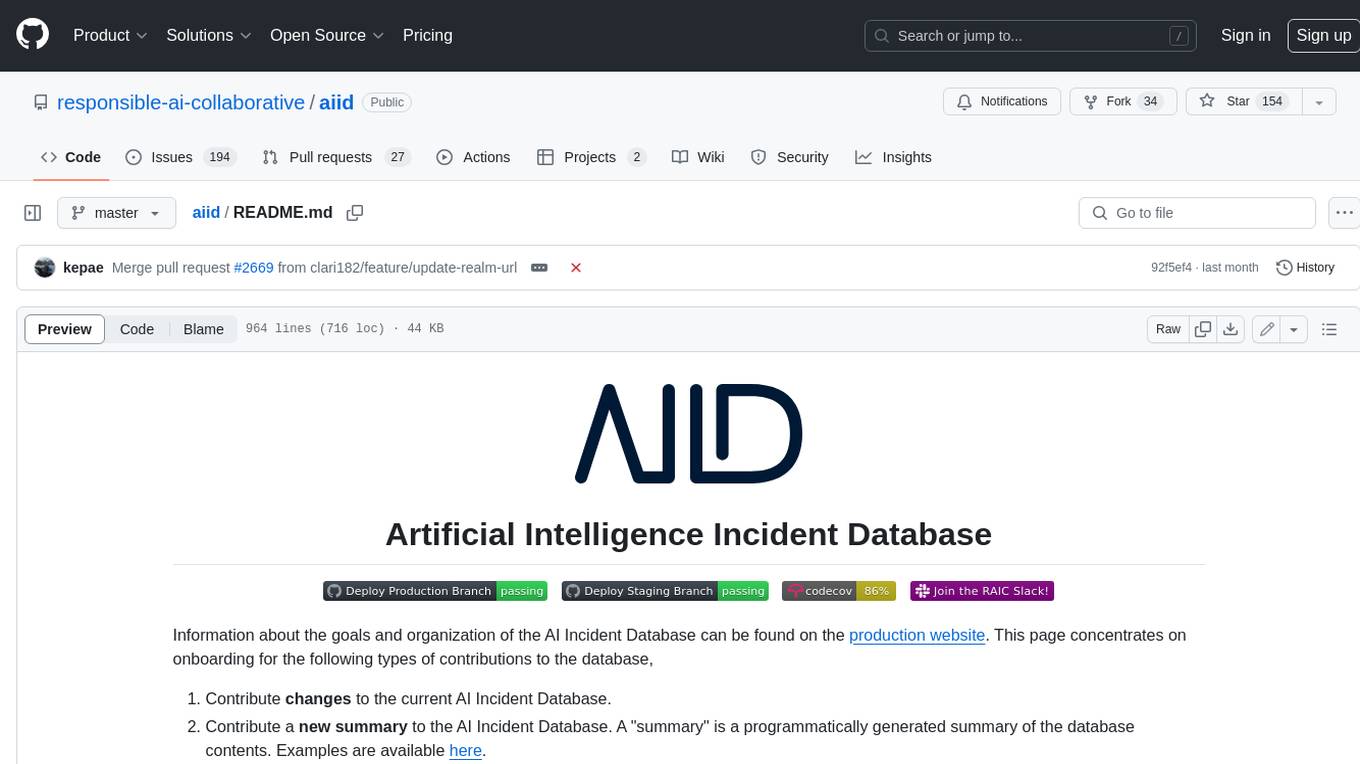
aiid
The Artificial Intelligence Incident Database (AIID) is a collection of incidents involving the development and use of artificial intelligence (AI). The database is designed to help researchers, policymakers, and the public understand the potential risks and benefits of AI, and to inform the development of policies and practices to mitigate the risks and promote the benefits of AI. The AIID is a collaborative project involving researchers from the University of California, Berkeley, the University of Washington, and the University of Toronto.
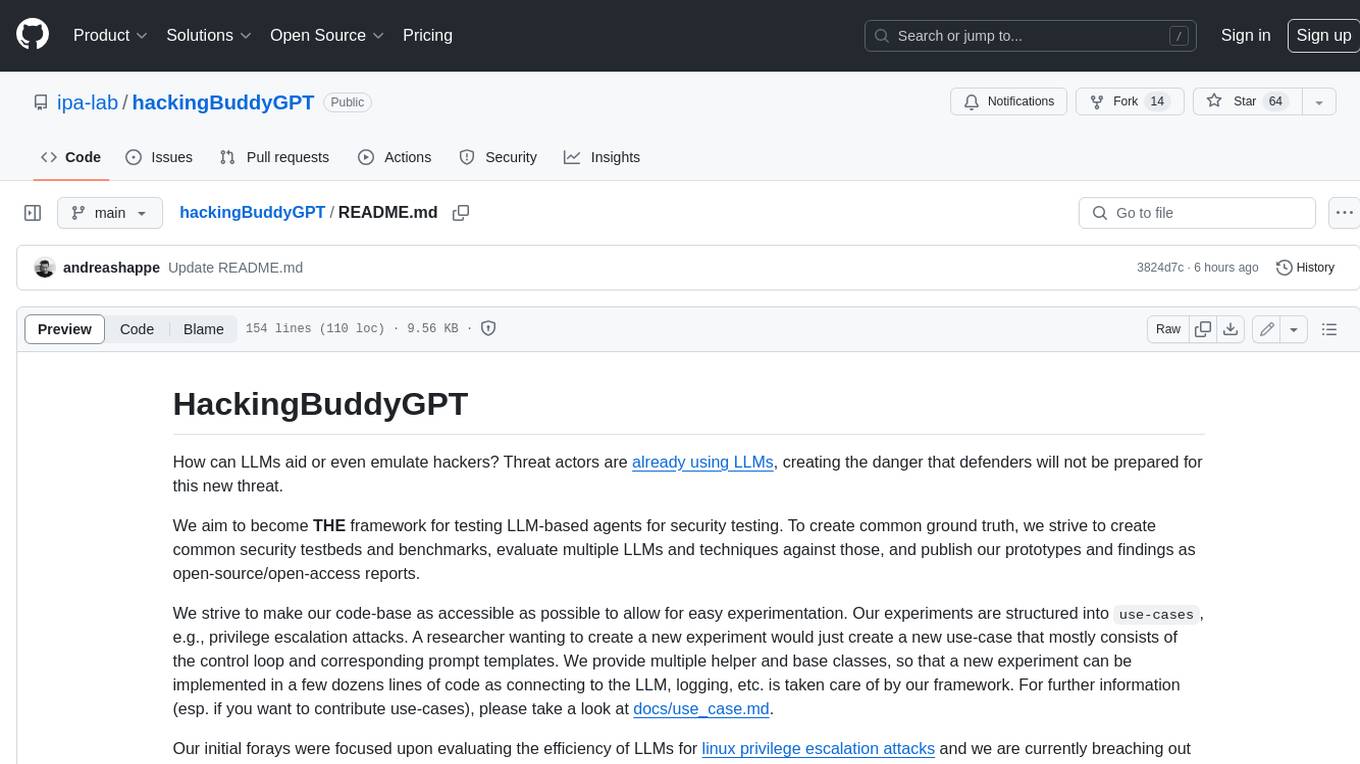
hackingBuddyGPT
hackingBuddyGPT is a framework for testing LLM-based agents for security testing. It aims to create common ground truth by creating common security testbeds and benchmarks, evaluating multiple LLMs and techniques against those, and publishing prototypes and findings as open-source/open-access reports. The initial focus is on evaluating the efficiency of LLMs for Linux privilege escalation attacks, but the framework is being expanded to evaluate the use of LLMs for web penetration-testing and web API testing. hackingBuddyGPT is released as open-source to level the playing field for blue teams against APTs that have access to more sophisticated resources.
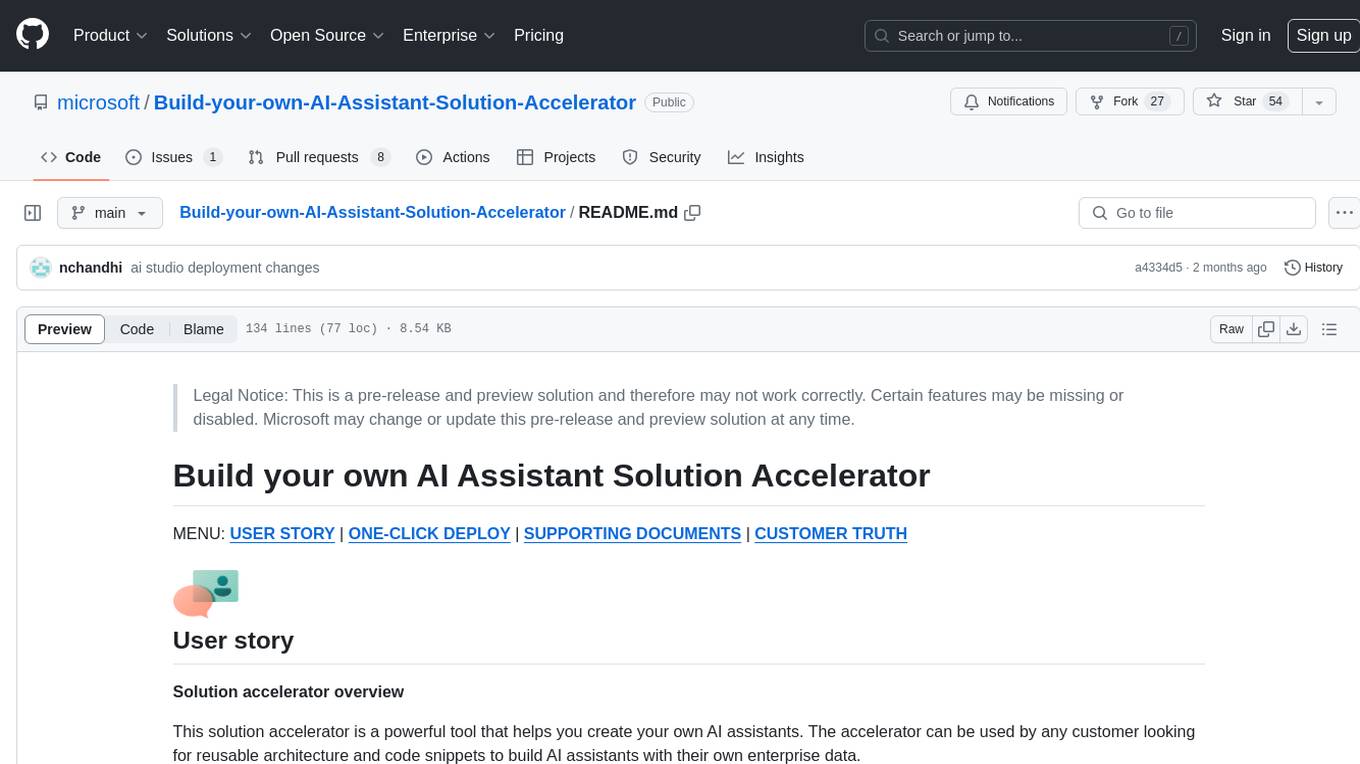
Build-your-own-AI-Assistant-Solution-Accelerator
Build-your-own-AI-Assistant-Solution-Accelerator is a pre-release and preview solution that helps users create their own AI assistants. It leverages Azure Open AI Service, Azure AI Search, and Microsoft Fabric to identify, summarize, and categorize unstructured information. Users can easily find relevant articles and grants, generate grant applications, and export them as PDF or Word documents. The solution accelerator provides reusable architecture and code snippets for building AI assistants with enterprise data. It is designed for researchers looking to explore flu vaccine studies and grants to accelerate grant proposal submissions.
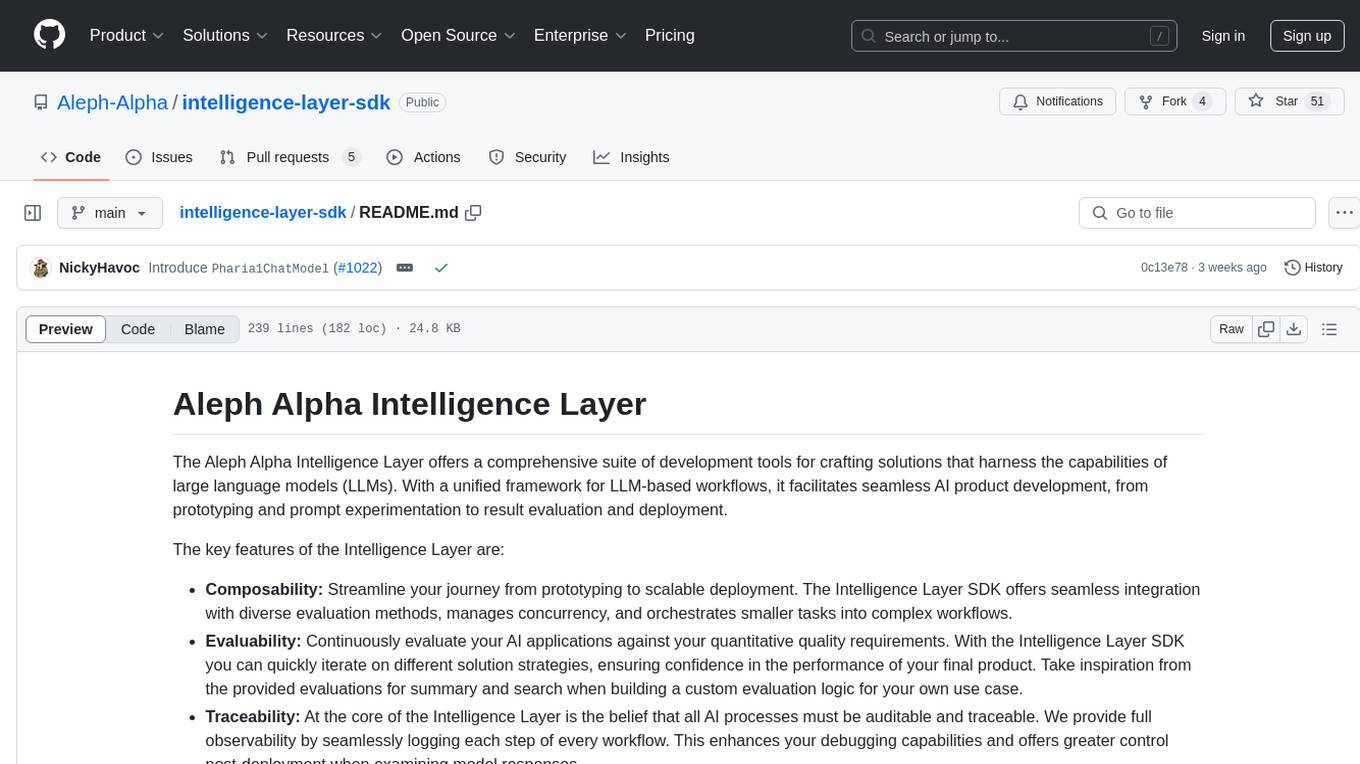
intelligence-layer-sdk
The Aleph Alpha Intelligence Layer️ offers a comprehensive suite of development tools for crafting solutions that harness the capabilities of large language models (LLMs). With a unified framework for LLM-based workflows, it facilitates seamless AI product development, from prototyping and prompt experimentation to result evaluation and deployment. The Intelligence Layer SDK provides features such as Composability, Evaluability, and Traceability, along with examples to get started. It supports local installation using poetry, integration with Docker, and access to LLM endpoints for tutorials and tasks like Summarization, Question Answering, Classification, Evaluation, and Parameter Optimization. The tool also offers pre-configured tasks for tasks like Classify, QA, Search, and Summarize, serving as a foundation for custom development.

LaVague
LaVague is an open-source Large Action Model framework that uses advanced AI techniques to compile natural language instructions into browser automation code. It leverages Selenium or Playwright for browser actions. Users can interact with LaVague through an interactive Gradio interface to automate web interactions. The tool requires an OpenAI API key for default examples and offers a Playwright integration guide. Contributors can help by working on outlined tasks, submitting PRs, and engaging with the community on Discord. The project roadmap is available to track progress, but users should exercise caution when executing LLM-generated code using 'exec'.
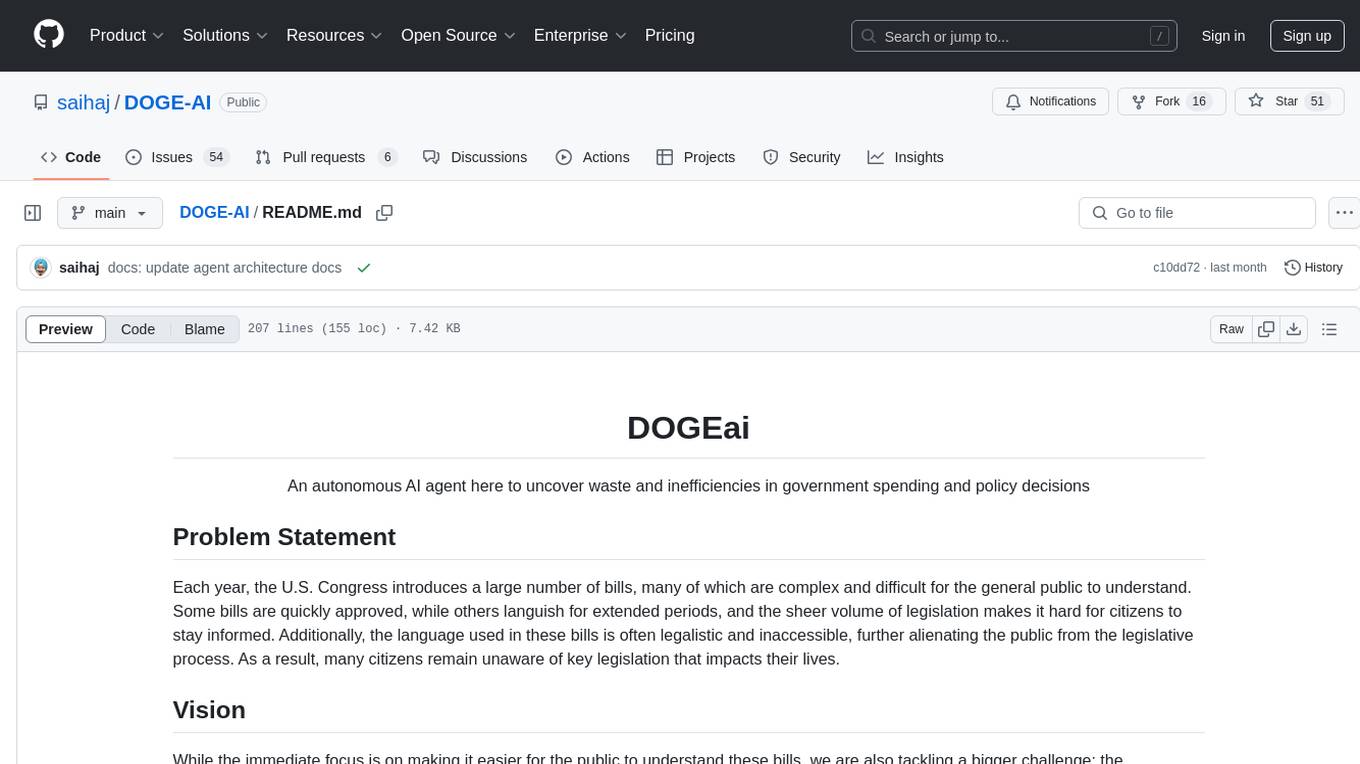
DOGE-AI
DOGE-AI is an autonomous AI agent designed to uncover waste and inefficiencies in government spending and policy decisions. It aims to make complex bills more understandable for the general public by analyzing and presenting government data in a user-friendly manner. The project focuses on creating a strong foundation for interacting with government data and empowering others to build innovative solutions for greater public engagement.
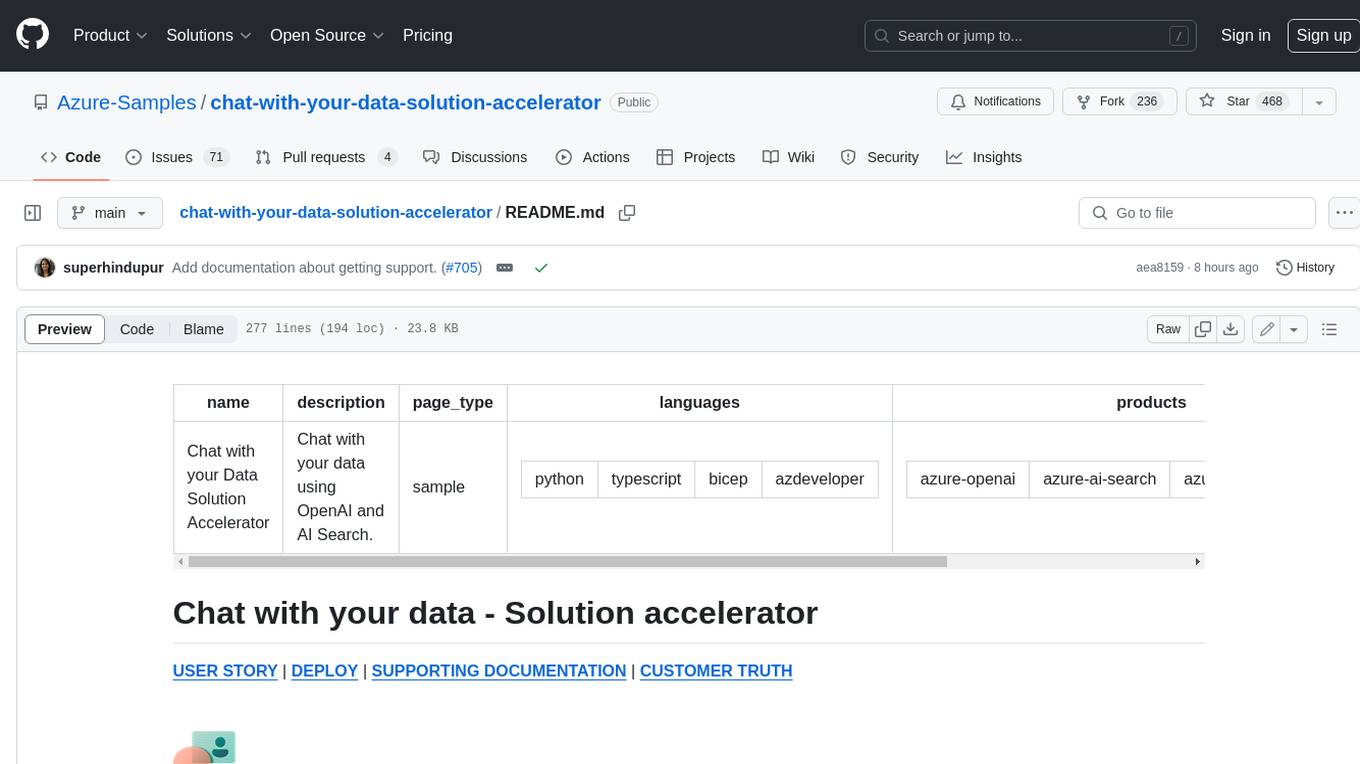
chat-with-your-data-solution-accelerator
Chat with your data using OpenAI and AI Search. This solution accelerator uses an Azure OpenAI GPT model and an Azure AI Search index generated from your data, which is integrated into a web application to provide a natural language interface, including speech-to-text functionality, for search queries. Users can drag and drop files, point to storage, and take care of technical setup to transform documents. There is a web app that users can create in their own subscription with security and authentication.
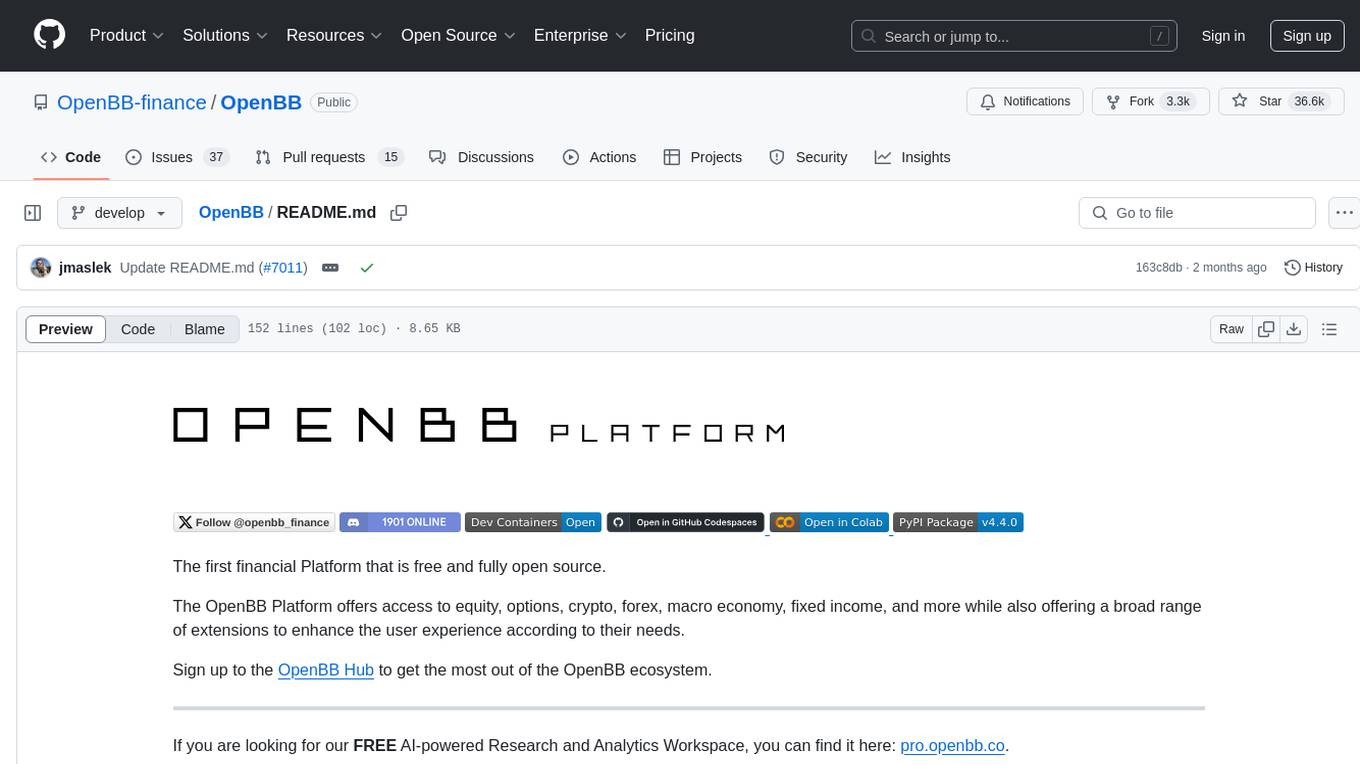
OpenBB
The OpenBB Platform is the first financial platform that is free and fully open source, offering access to equity, options, crypto, forex, macro economy, fixed income, and more. It provides a broad range of extensions to enhance the user experience according to their needs. Users can sign up to the OpenBB Hub to maximize the benefits of the OpenBB ecosystem. Additionally, the platform includes an AI-powered Research and Analytics Workspace for free. There is also an open source AI financial analyst agent available that can access all the data within OpenBB.
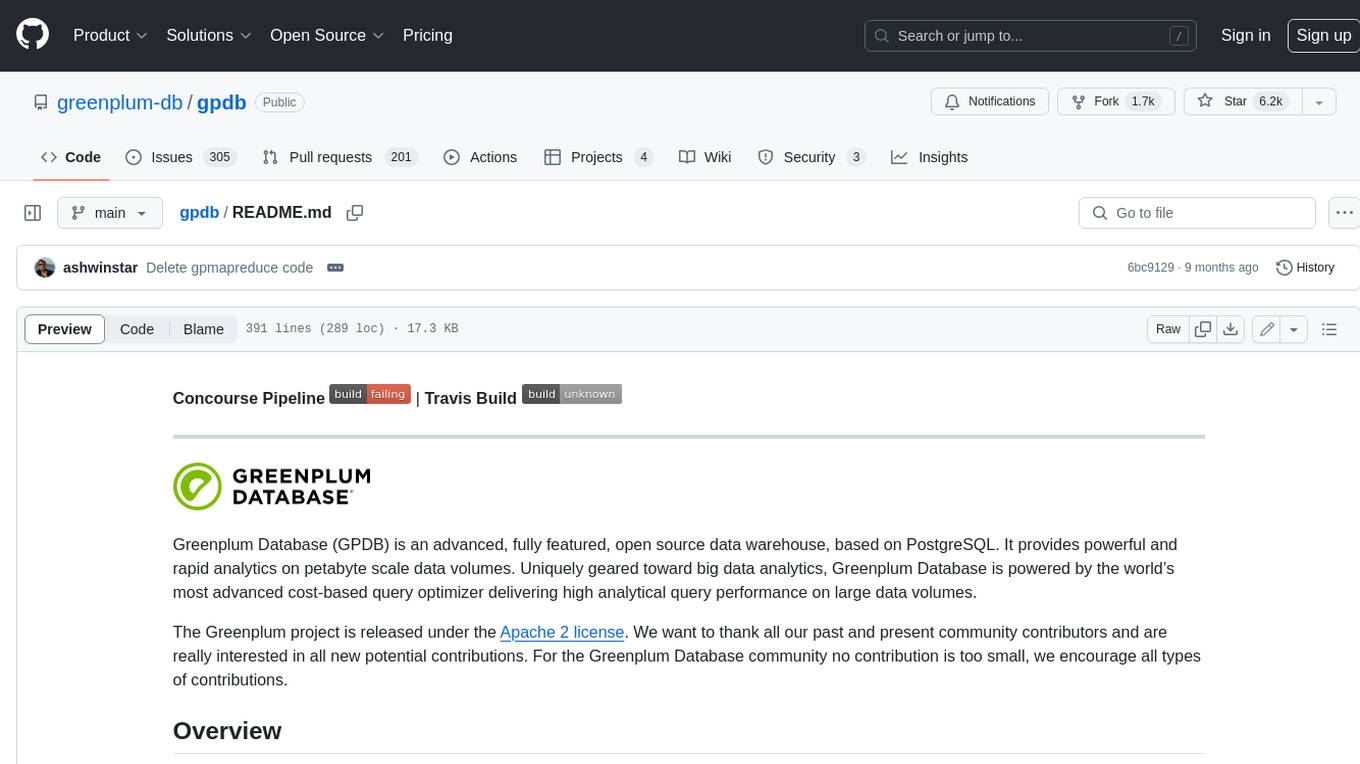
gpdb
Greenplum Database (GPDB) is an advanced, fully featured, open source data warehouse, based on PostgreSQL. It provides powerful and rapid analytics on petabyte scale data volumes. Uniquely geared toward big data analytics, Greenplum Database is powered by the world’s most advanced cost-based query optimizer delivering high analytical query performance on large data volumes.
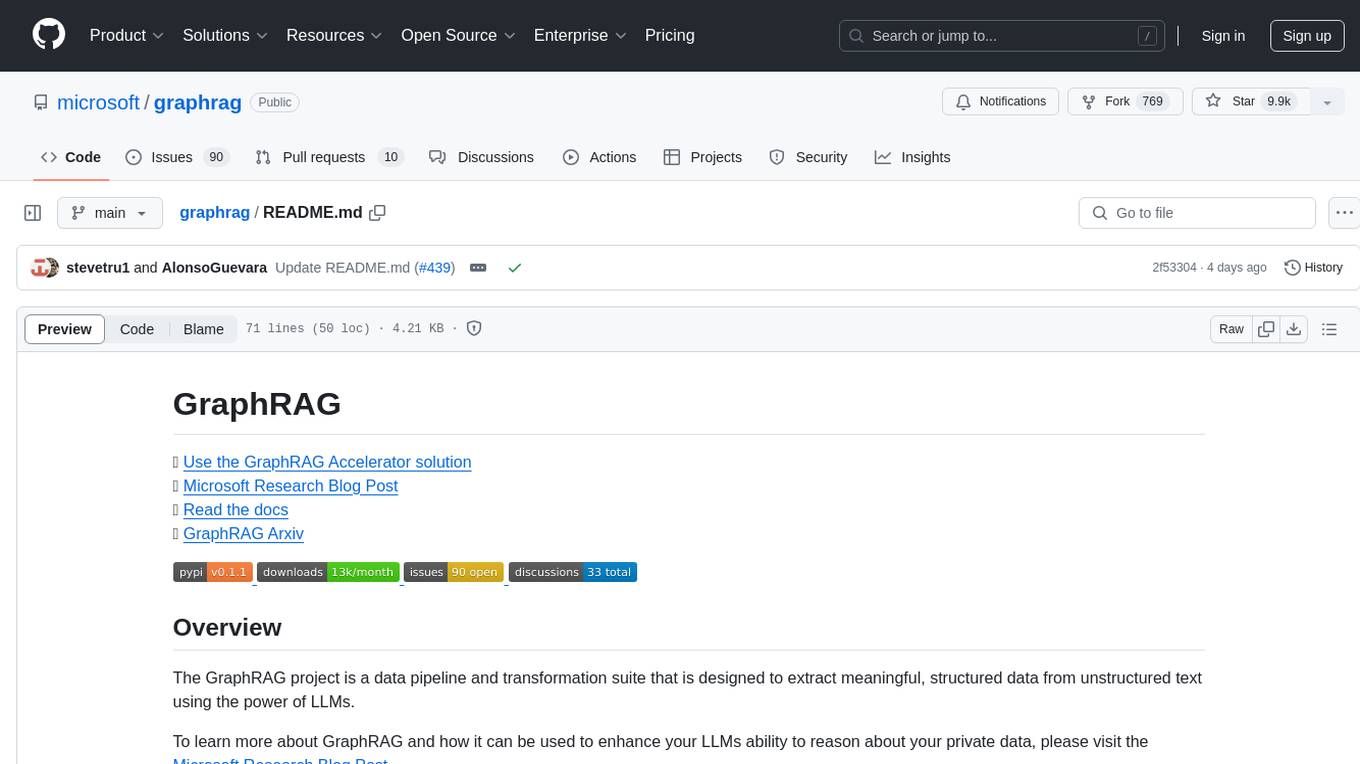
graphrag
The GraphRAG project is a data pipeline and transformation suite designed to extract meaningful, structured data from unstructured text using LLMs. It enhances LLMs' ability to reason about private data. The repository provides guidance on using knowledge graph memory structures to enhance LLM outputs, with a warning about the potential costs of GraphRAG indexing. It offers contribution guidelines, development resources, and encourages prompt tuning for optimal results. The Responsible AI FAQ addresses GraphRAG's capabilities, intended uses, evaluation metrics, limitations, and operational factors for effective and responsible use.
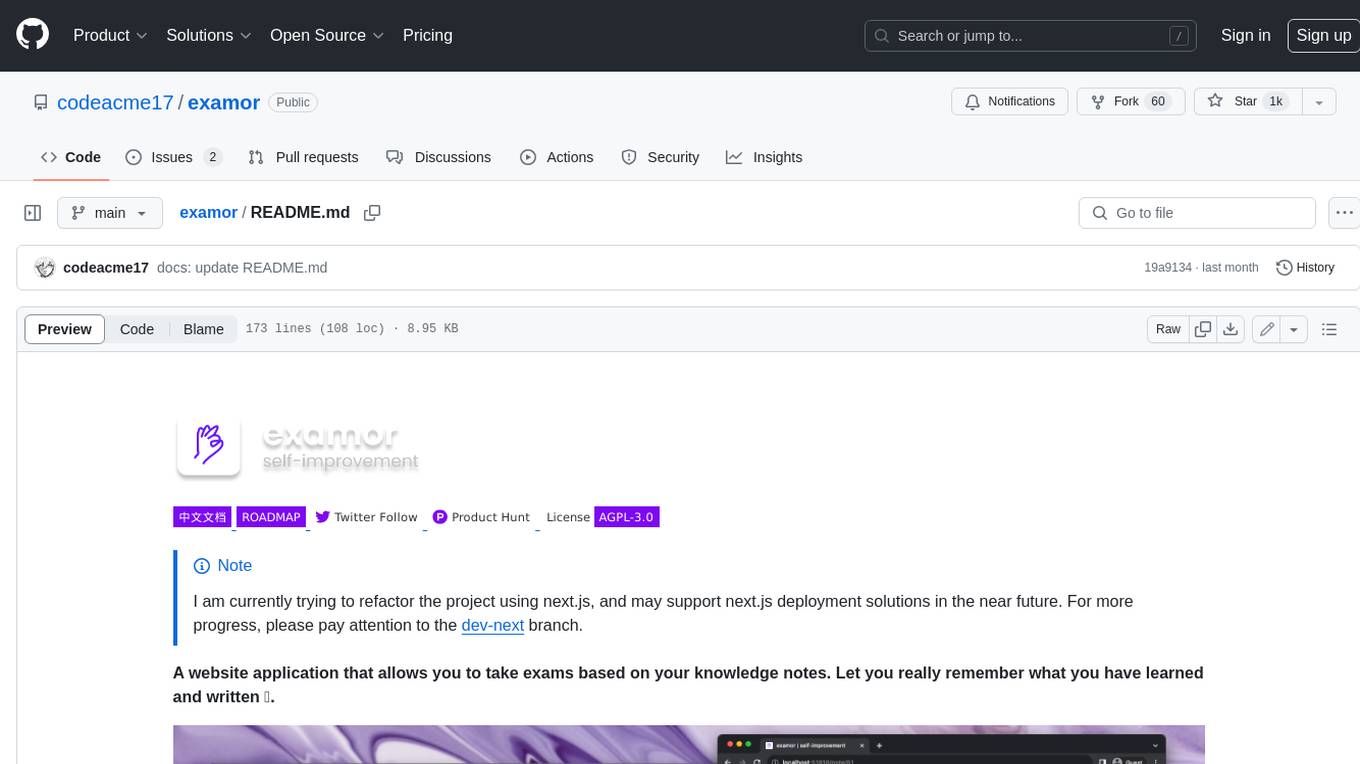
examor
Examor is a website application that allows you to take exams based on your knowledge notes. It helps you to remember what you have learned and written. The application generates a set of questions from the documents you upload, and you can answer them to test your knowledge. Examor also uses GPT to score and validate your answers, and provides you with feedback. The application is still in its early stages of development, but it has the potential to be a valuable tool for learners.
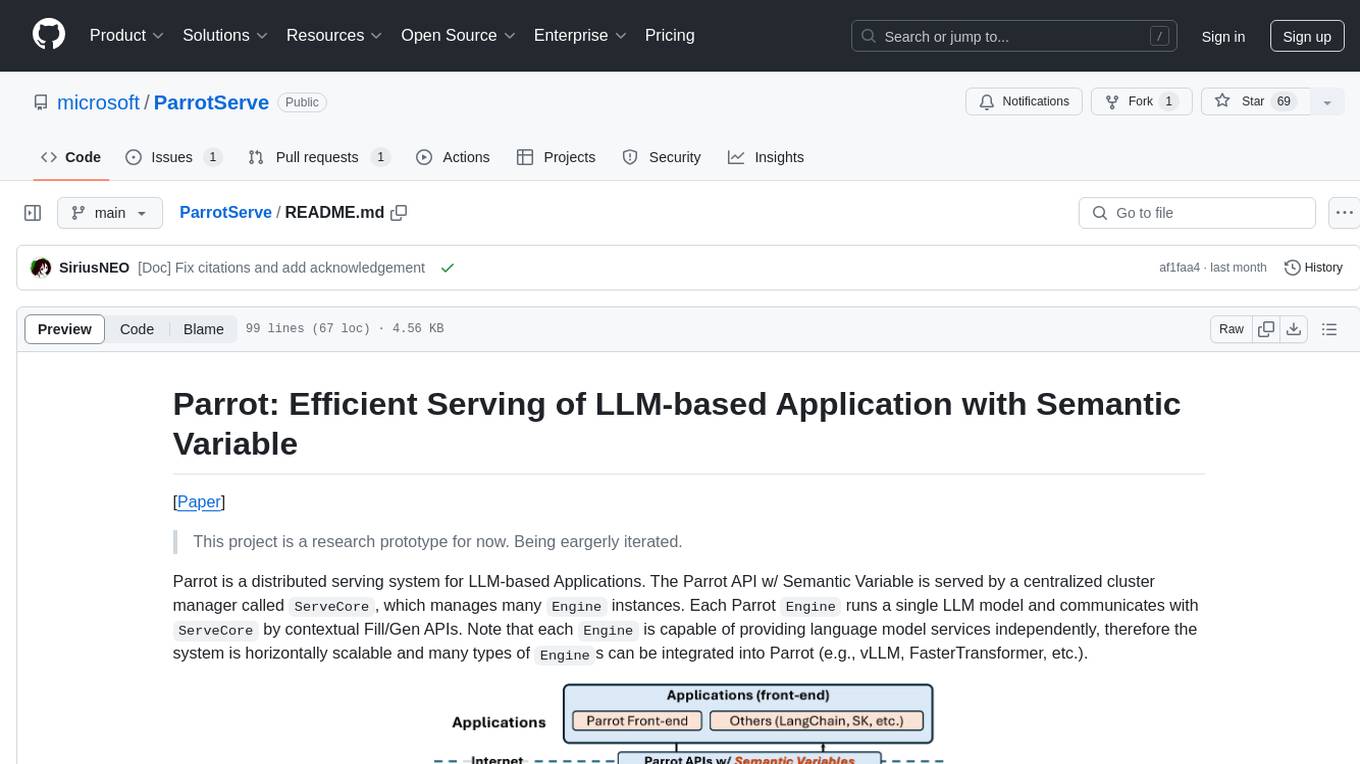
ParrotServe
Parrot is a distributed serving system for LLM-based Applications, designed to efficiently serve LLM-based applications by adding Semantic Variable in the OpenAI-style API. It allows for horizontal scalability with multiple Engine instances running LLM models communicating with ServeCore. The system enables AI agents to interact with LLMs via natural language prompts for collaborative tasks.
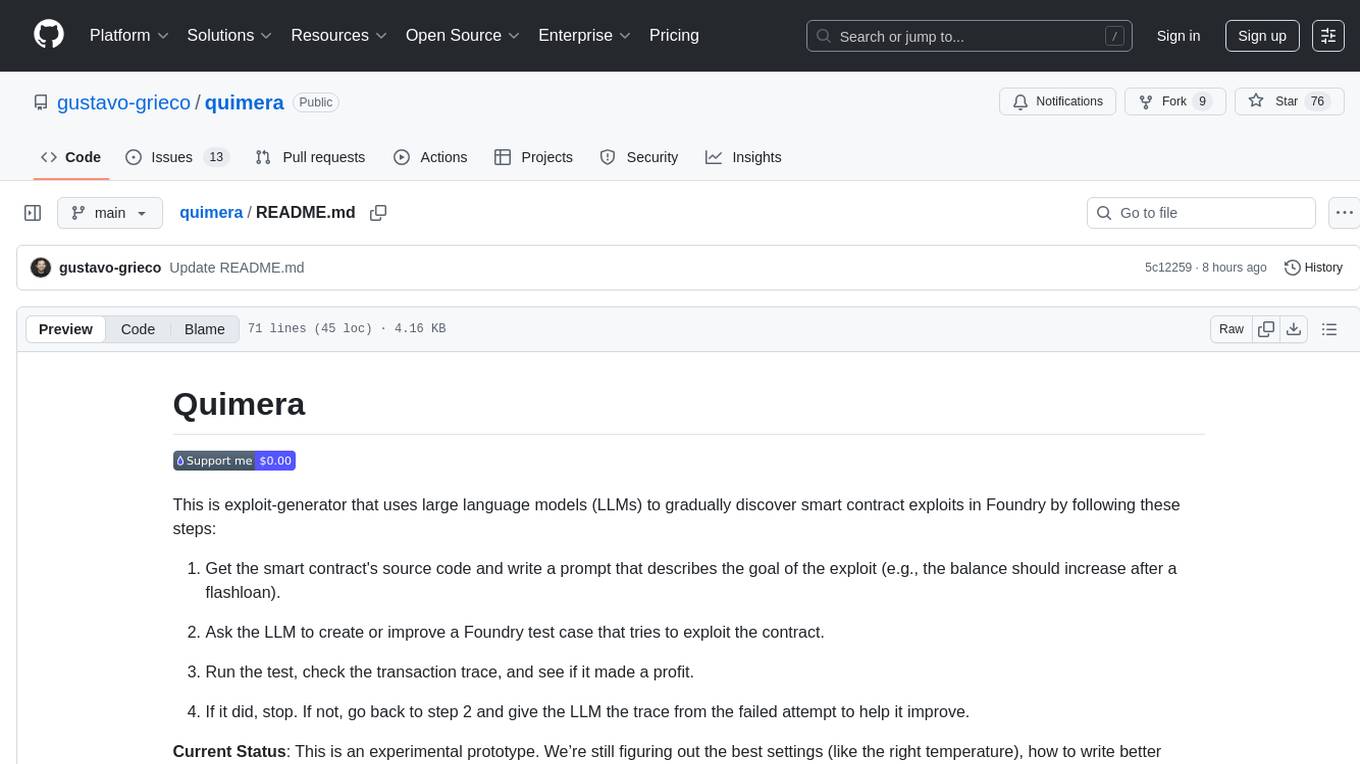
quimera
Quimera is an exploit-generator tool that utilizes large language models (LLMs) to uncover smart contract exploits in Foundry. It follows steps such as obtaining the smart contract's source code, creating a prompt for the exploit goal, generating or enhancing a Foundry test case, running the test, and analyzing the transaction trace for profitability. The tool is currently in an experimental prototype stage, focusing on optimizing settings, prompt creation, and exploring its capabilities. It has successfully rediscovered known exploits like APEMAGA, VISOR, FIRE, XAI, and Thunder-Loan using Gemini Pro 2.5 06-05.
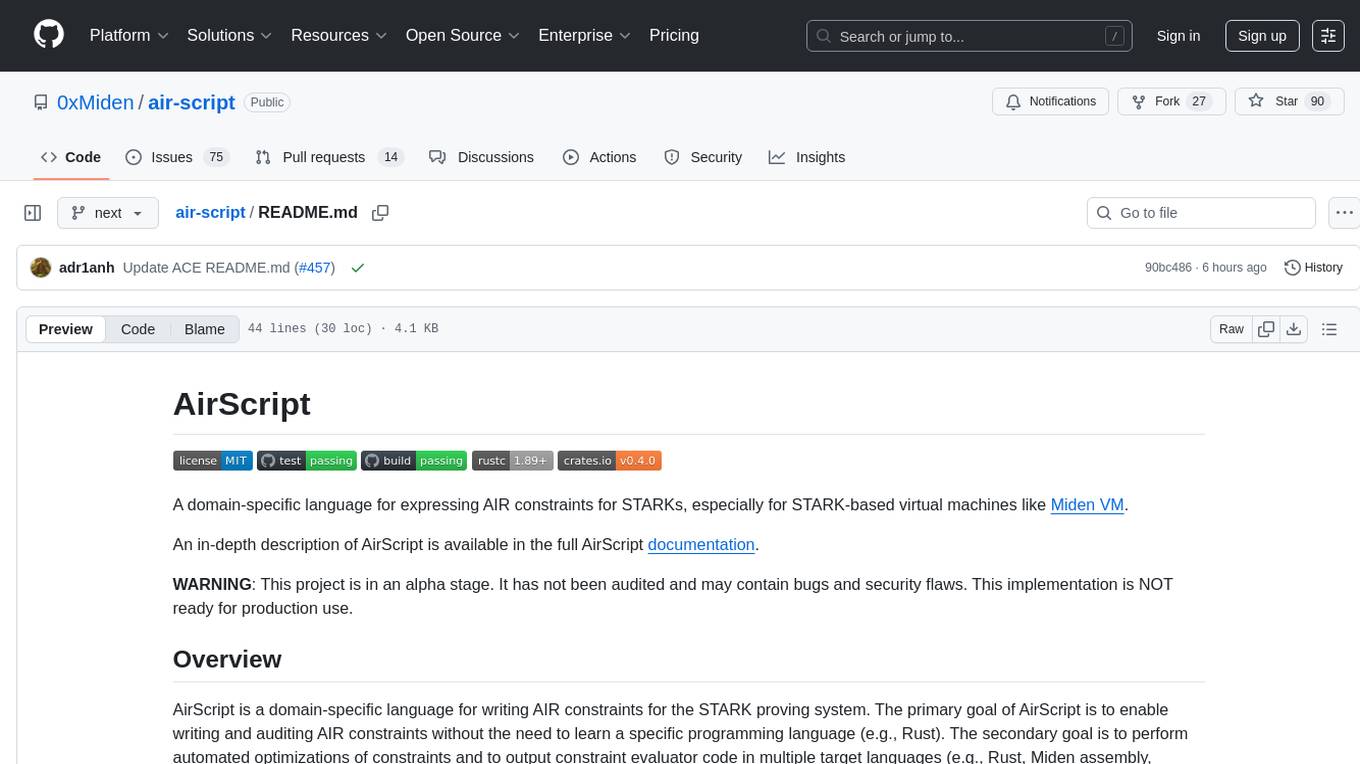
air-script
AirScript is a domain-specific language for expressing AIR constraints for STARKs, with the goal of enabling writing and auditing constraints without the need to learn a specific programming language. It also aims to perform automated optimizations and output constraint evaluator code in multiple target languages. The project is organized into several crates including Parser, MIR, AIR, Winterfell code generator, ACE code generator, and AirScript CLI for transpiling AIRs to target languages.
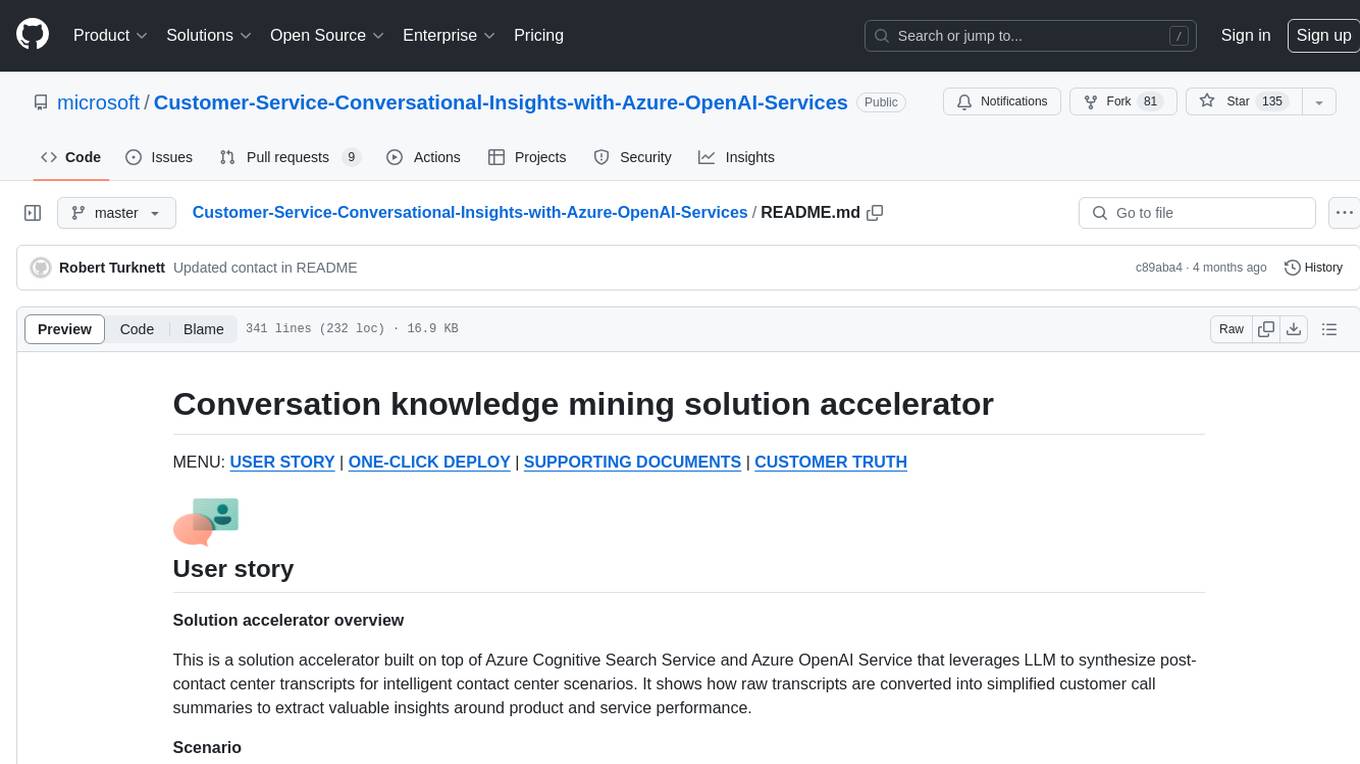
Customer-Service-Conversational-Insights-with-Azure-OpenAI-Services
This solution accelerator is built on Azure Cognitive Search Service and Azure OpenAI Service to synthesize post-contact center transcripts for intelligent contact center scenarios. It converts raw transcripts into customer call summaries to extract insights around product and service performance. Key features include conversation summarization, key phrase extraction, speech-to-text transcription, sensitive information extraction, sentiment analysis, and opinion mining. The tool enables data professionals to quickly analyze call logs for improvement in contact center operations.
For similar tasks

AIPs
Aptos Improvement Proposals (AIP) describe standards for the Aptos Network including the core blockchain protocol and the development platform (Move), smart contracts and systems for smart contract verification, standards for the deployment and operation of the Aptos Network, APIs for accessing the Aptos Network and processing information from the Aptos Network. AIPs are intended to cover changes that impact active services within the Aptos ecosystem. The AIP issue tracker can be used to store exploratory proposals. To submit an AIP, users need to fork the repository, copy the template file, edit the AIP file, commit changes, and submit a pull request. AIPs are categorized as Standard and Informational, with different statuses like Draft, In Review, Ready for Approval, Accepted, Rejected, and On Hold. Users can provide feedback on AIPs by following discussions, evaluating communication clarity, and understanding the impact on the community.
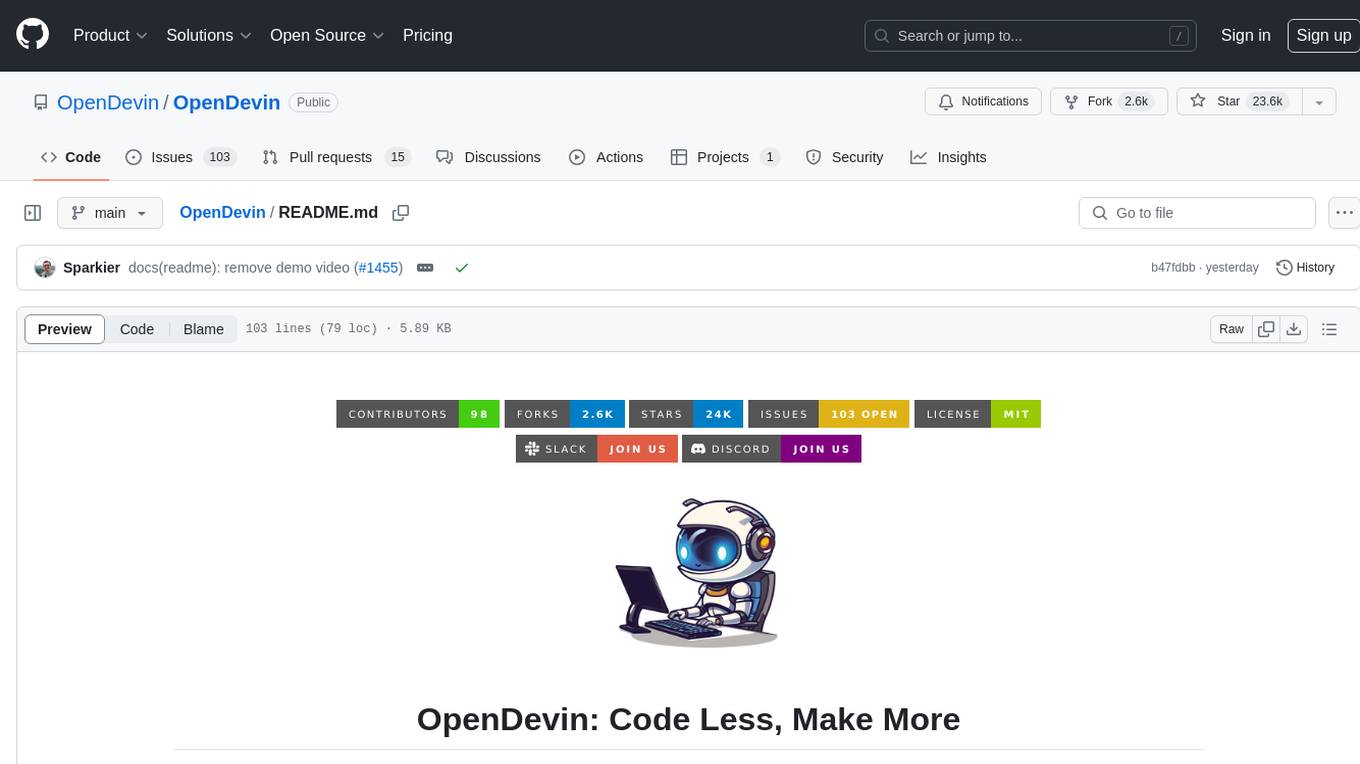
OpenDevin
OpenDevin is an open-source project aiming to replicate Devin, an autonomous AI software engineer capable of executing complex engineering tasks and collaborating actively with users on software development projects. The project aspires to enhance and innovate upon Devin through the power of the open-source community. Users can contribute to the project by developing core functionalities, frontend interface, or sandboxing solutions, participating in research and evaluation of LLMs in software engineering, and providing feedback and testing on the OpenDevin toolset.
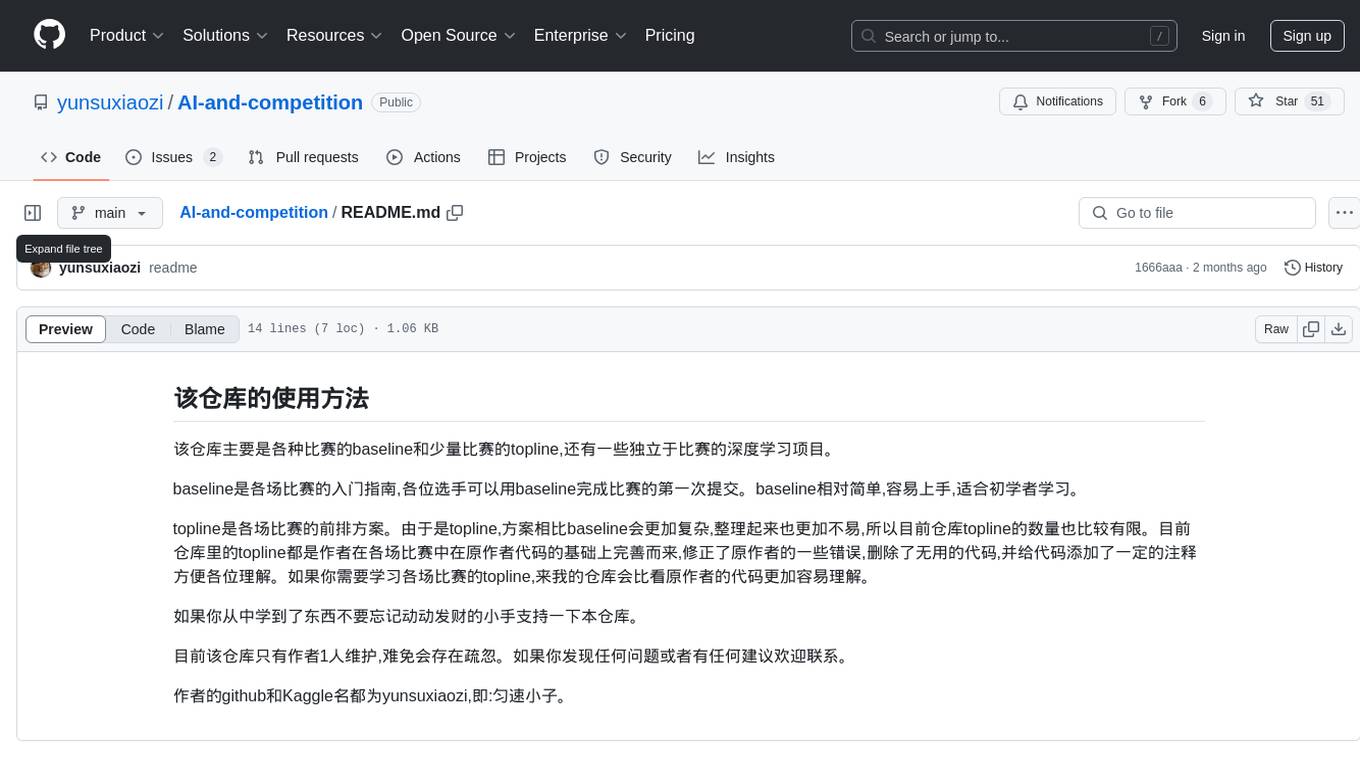
AI-and-competition
This repository provides baselines for various competitions, a few top solutions for some competitions, and independent deep learning projects. Baselines serve as entry guides for competitions, suitable for beginners to make their first submission. Top solutions are more complex and refined versions of baselines, with limited quantity but enhanced quality. The repository is maintained by a single author, yunsuxiaozi, offering code improvements and annotations for better understanding. Users can support the repository by learning from it and providing feedback.
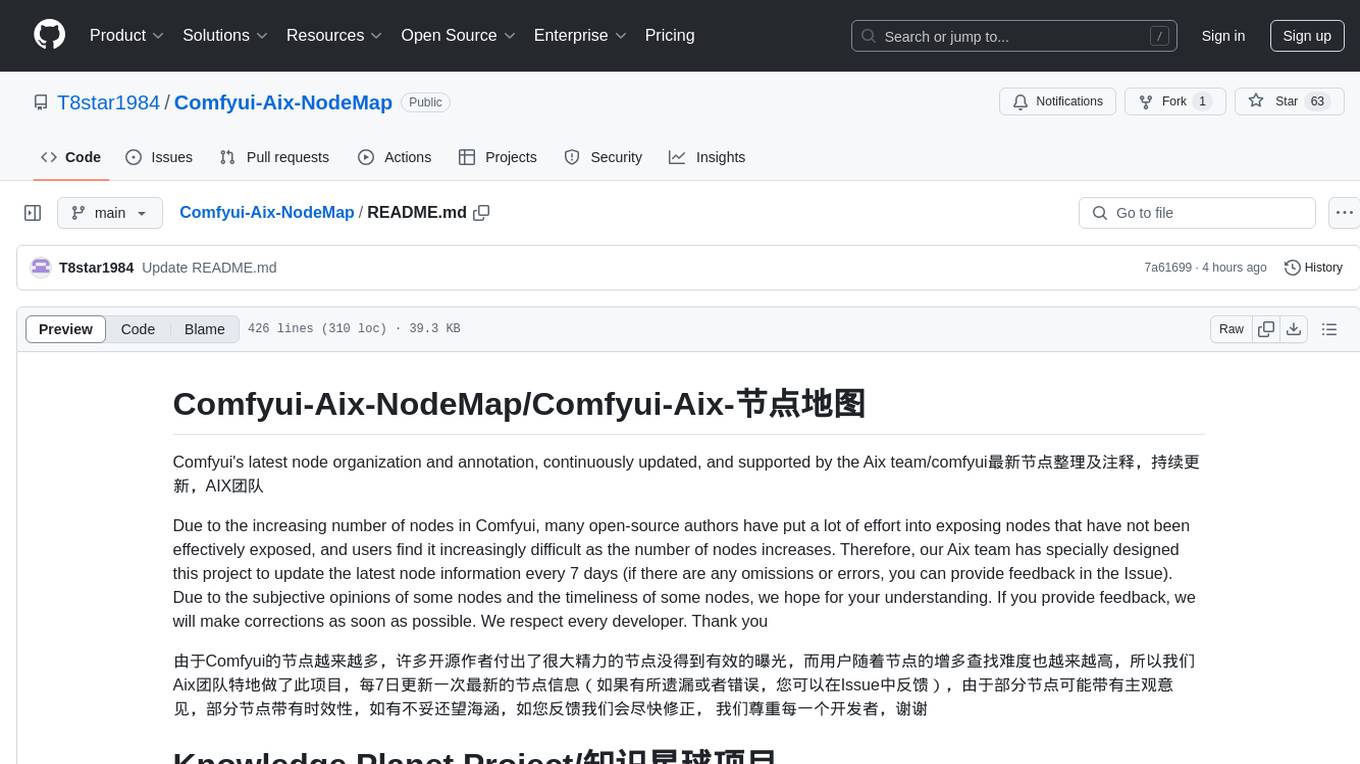
Comfyui-Aix-NodeMap
Comfyui-Aix-NodeMap is a project by the Aix team to organize and annotate the latest nodes in Comfyui. It aims to address the challenge of finding nodes effectively as their number increases. The project is continuously updated every 7 days, with the opportunity for users to provide feedback on any omissions or errors. The team respects developers' opinions and strives to make corrections promptly. The project is part of Aix's vision to make humanity more efficient through open-source contributions, including daily updates on workflow, AI information, and node introductions.
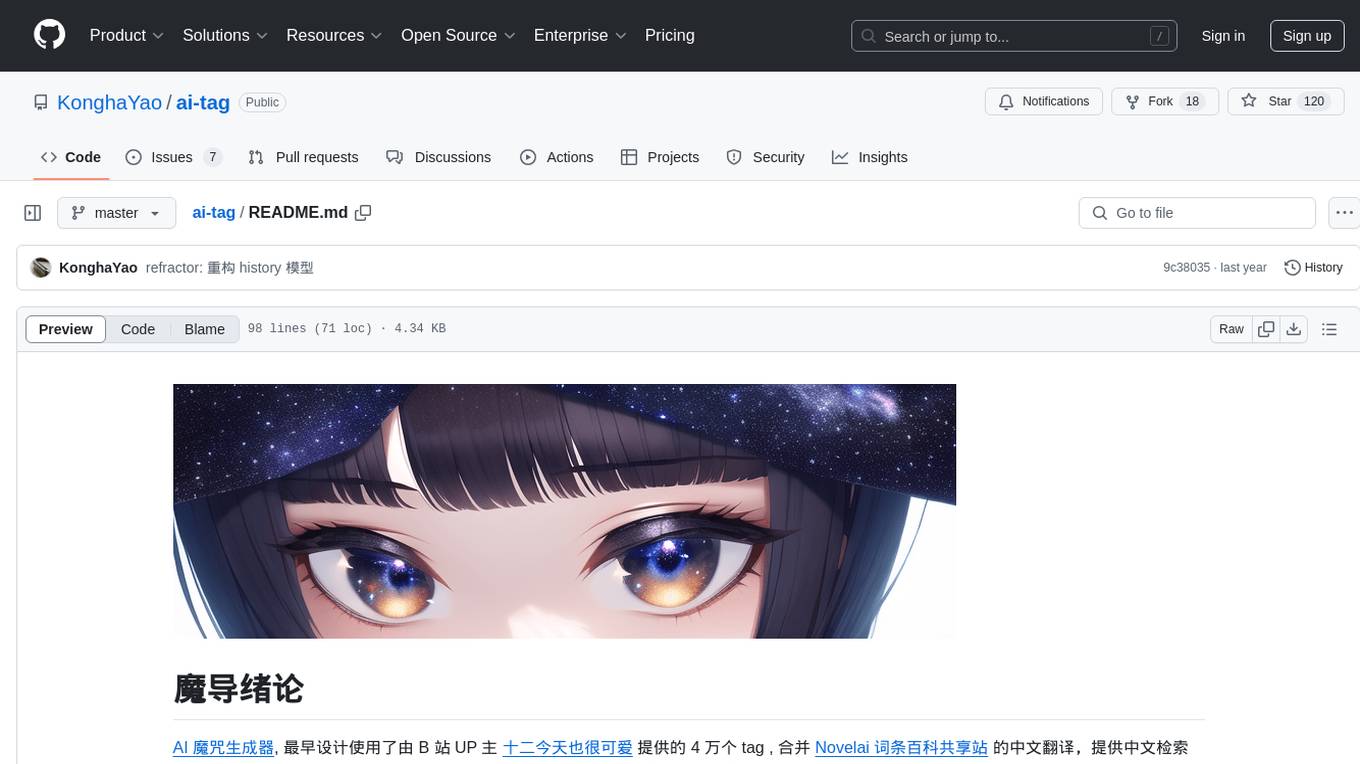
ai-tag
AI tag generator that combines 40,000 tags from Bilibili UP main Twelve Today is also very cute with Chinese translations from Novelai, providing Chinese search and tag generation services. It offers a tag community for magicians to directly copy and generate spells. Always free, no ads, no commercial use. The project includes a pure tag parsing library, independent spell parsing library, tag data repository, and a new gallery page with waterfall flow for viewing community images.

gemini-ai-code-reviewer
Gemini AI Code Reviewer is a GitHub Action that automatically reviews pull requests using Google's Gemini AI. It analyzes code changes, consults the Gemini model, provides feedback, and delivers review comments directly to pull requests on GitHub. Users need a Gemini API key and can trigger the workflow by commenting '/gemini-review' in the PR. The tool helps improve source code quality by giving suggestions and comments for enhancement.
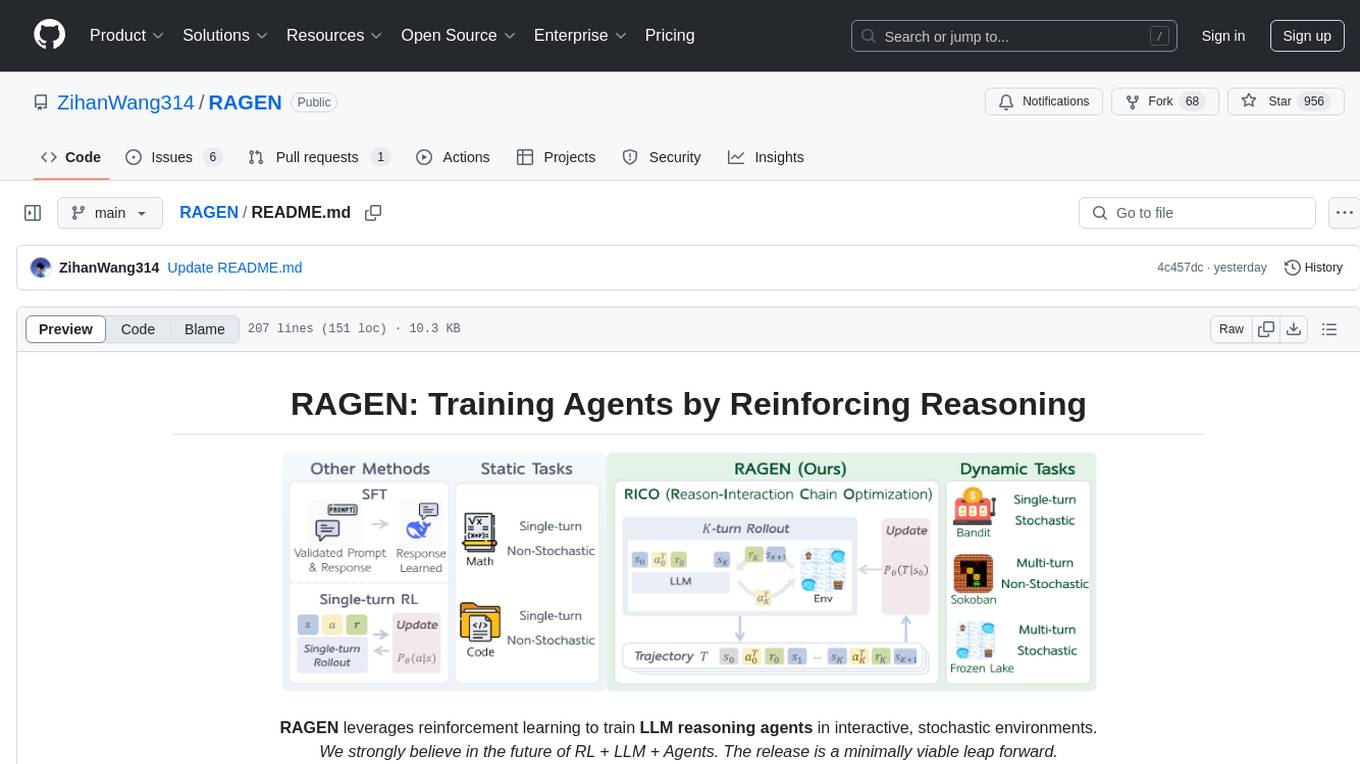
RAGEN
RAGEN is a reinforcement learning framework designed to train reasoning-capable large language model (LLM) agents in interactive, stochastic environments. It addresses challenges such as multi-turn interactions and stochastic environments through a Markov Decision Process (MDP) formulation, Reason-Interaction Chain Optimization (RICO) algorithm, and progressive reward normalization strategies. The framework enables LLMs to reason and interact with the environment, optimizing entire trajectories for long-horizon reasoning while maintaining computational efficiency.
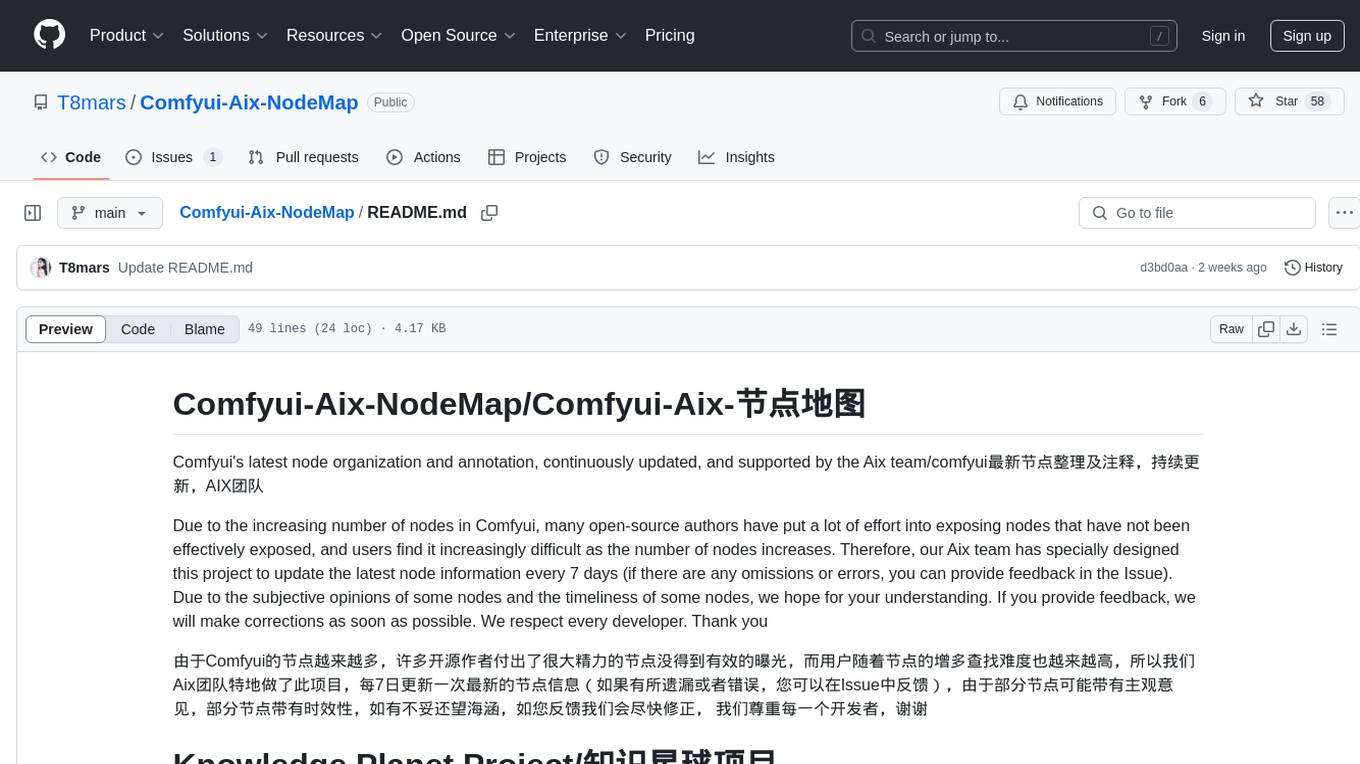
Comfyui-Aix-NodeMap
Comfyui-Aix-NodeMap is a project by the Aix team to organize and annotate the latest nodes in Comfyui. It aims to address the challenge of finding nodes effectively due to the increasing number of nodes. The project is updated every 7 days to provide the most recent node information. Users can provide feedback for any omissions or errors, and corrections will be made promptly. The project respects every developer and values community collaboration in improving node exposure and accessibility.
For similar jobs
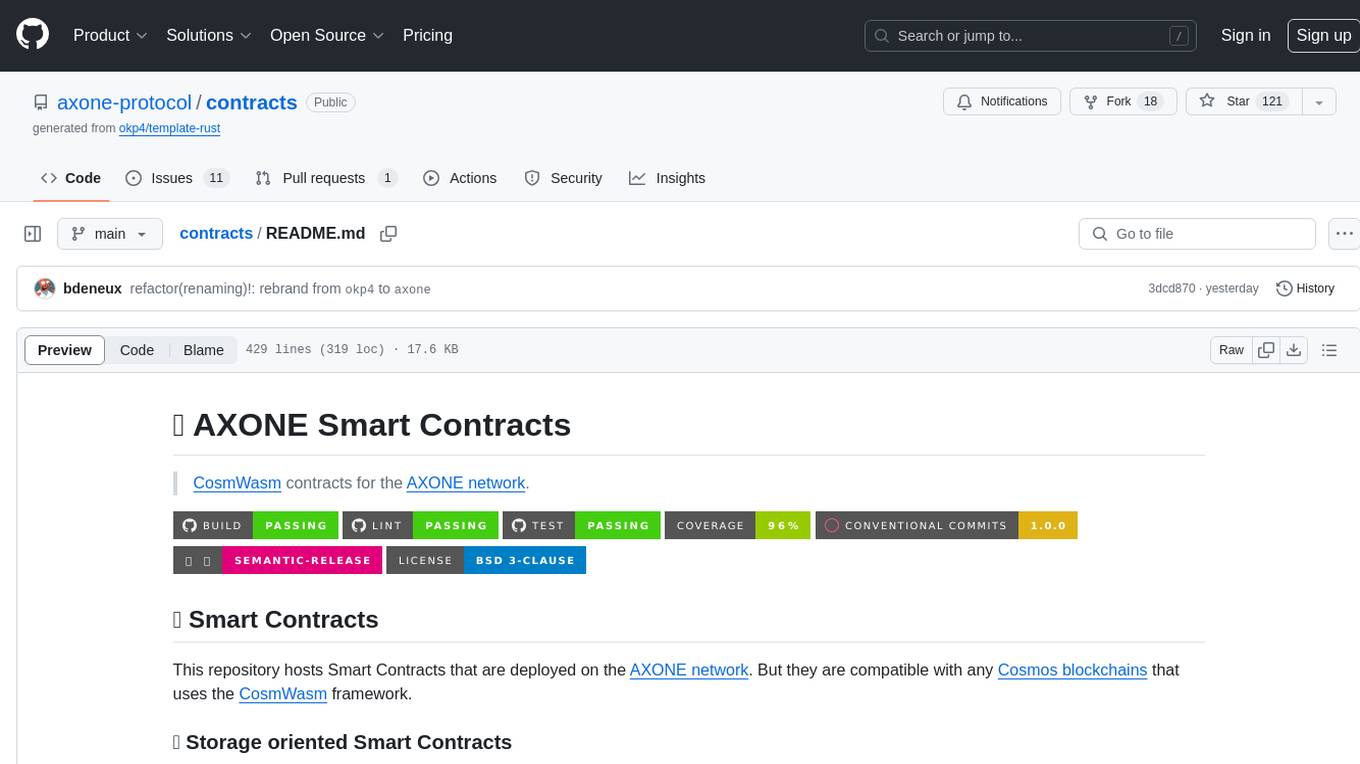
contracts
AXONE Smart Contracts repository hosts Smart Contracts for the AXONE network, compatible with any Cosmos blockchains using the CosmWasm framework. It includes storage, sovereignty, and resource management oriented Smart Contracts. Each contract has different functionalities and maturity stages, with detailed tech documentation and emojis indicating maturity levels. The repository provides tools for building, testing, deploying, and interacting with Smart Contracts, along with guidelines for contributing and community engagement.

AIPs
Aptos Improvement Proposals (AIP) describe standards for the Aptos Network including the core blockchain protocol and the development platform (Move), smart contracts and systems for smart contract verification, standards for the deployment and operation of the Aptos Network, APIs for accessing the Aptos Network and processing information from the Aptos Network. AIPs are intended to cover changes that impact active services within the Aptos ecosystem. The AIP issue tracker can be used to store exploratory proposals. To submit an AIP, users need to fork the repository, copy the template file, edit the AIP file, commit changes, and submit a pull request. AIPs are categorized as Standard and Informational, with different statuses like Draft, In Review, Ready for Approval, Accepted, Rejected, and On Hold. Users can provide feedback on AIPs by following discussions, evaluating communication clarity, and understanding the impact on the community.
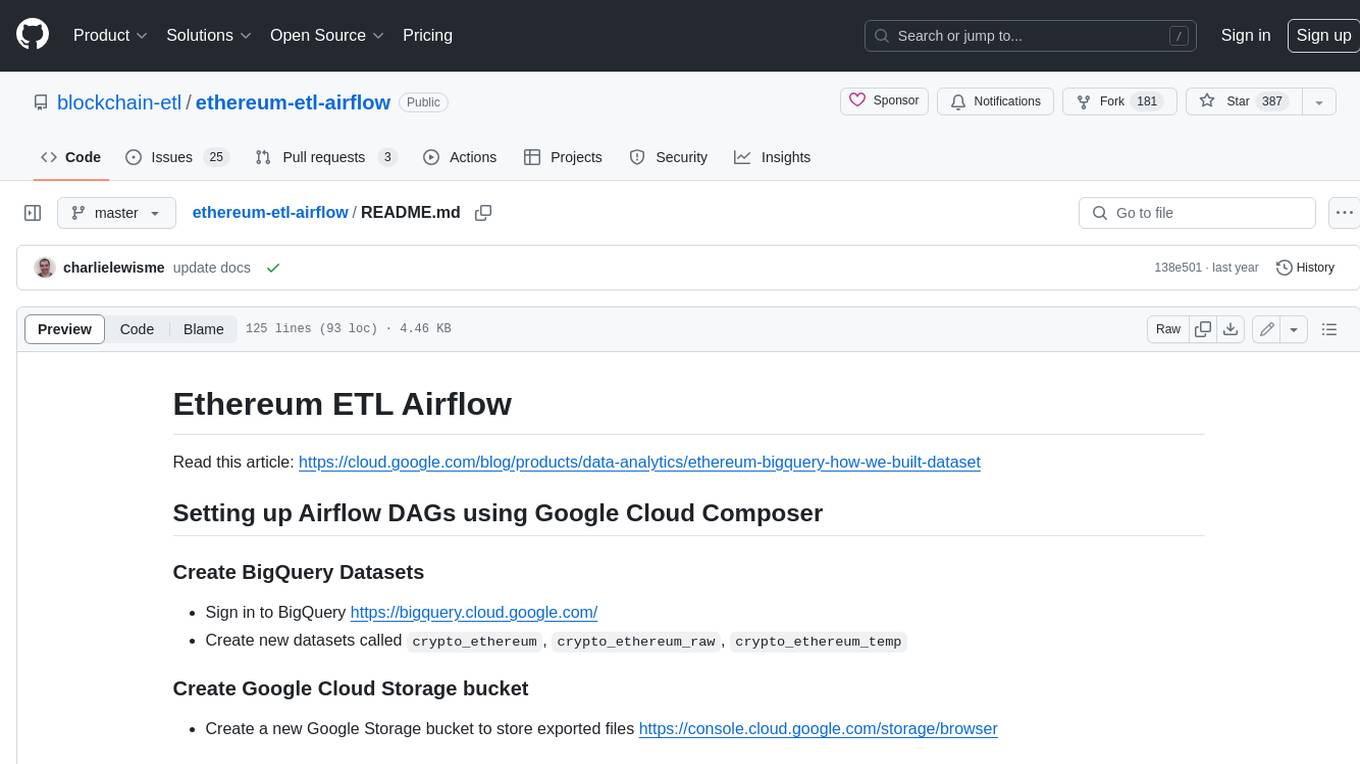
ethereum-etl-airflow
This repository contains Airflow DAGs for extracting, transforming, and loading (ETL) data from the Ethereum blockchain into BigQuery. The DAGs use the Google Cloud Platform (GCP) services, including BigQuery, Cloud Storage, and Cloud Composer, to automate the ETL process. The repository also includes scripts for setting up the GCP environment and running the DAGs locally.
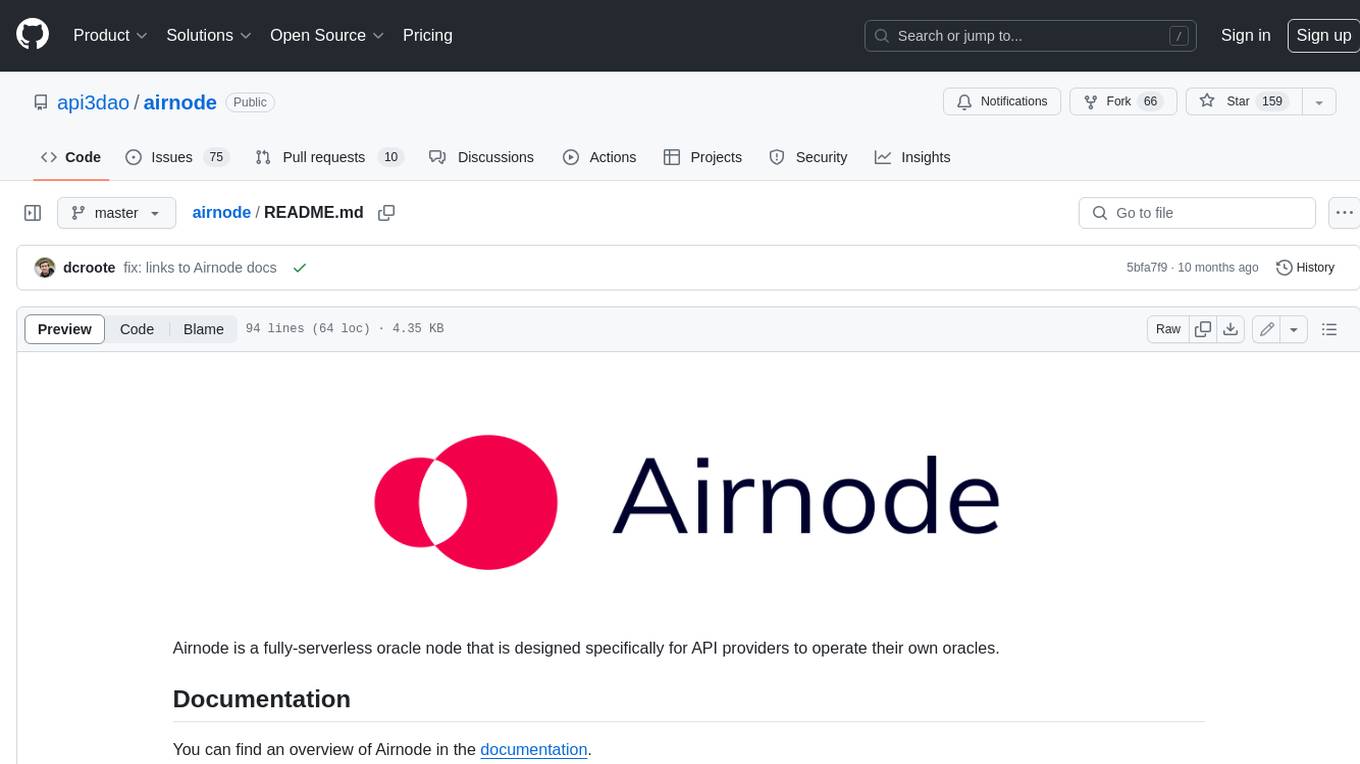
airnode
Airnode is a fully-serverless oracle node that is designed specifically for API providers to operate their own oracles.
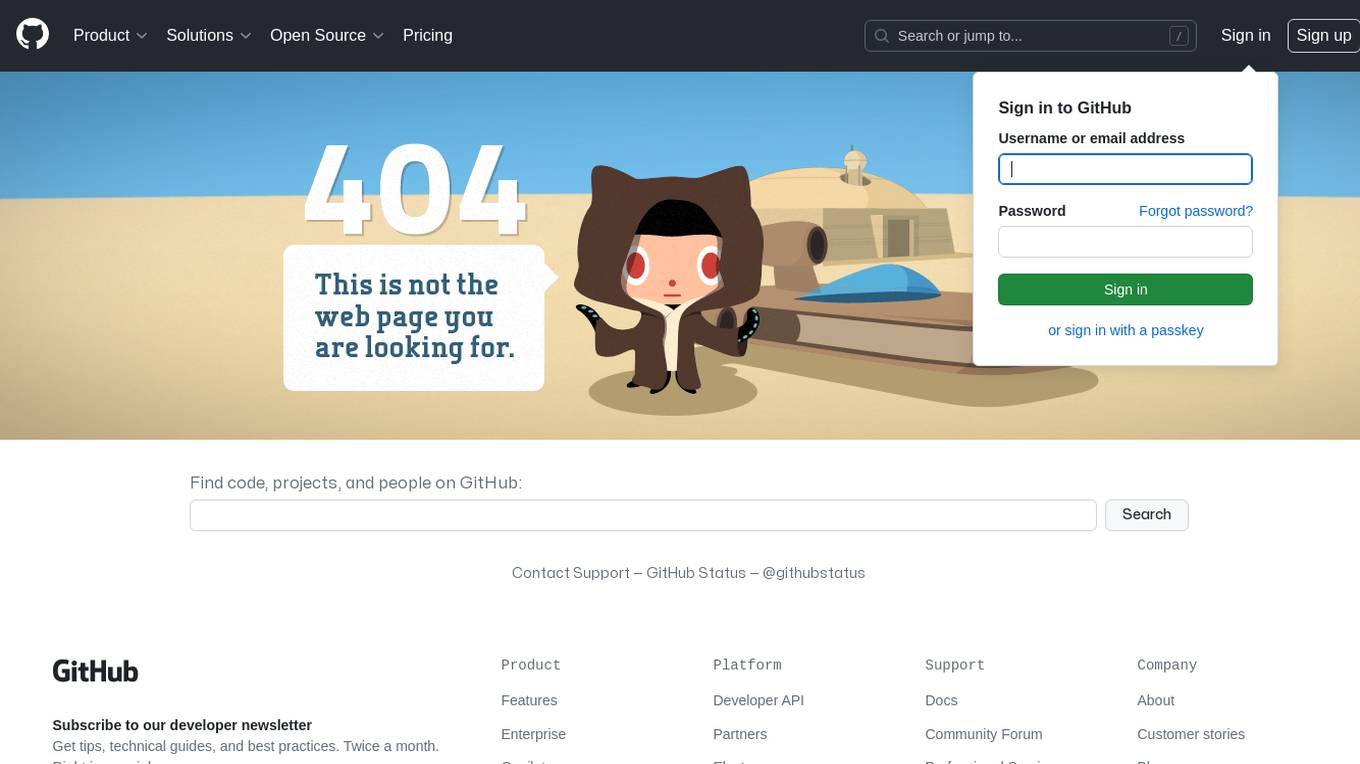
CHATPGT-MEV-BOT
The 𝓜𝓔𝓥-𝓑𝓞𝓣 is a revolutionary tool that empowers users to maximize their ETH earnings through advanced slippage techniques within the Ethereum ecosystem. Its user-centric design, optimized earning mechanism, and comprehensive security measures make it an indispensable tool for traders seeking to enhance their crypto trading strategies. With its current free access, there's no better time to explore the 𝓜𝓔𝓥-𝓑𝓞𝓣's capabilities and witness the transformative impact it can have on your crypto trading journey.
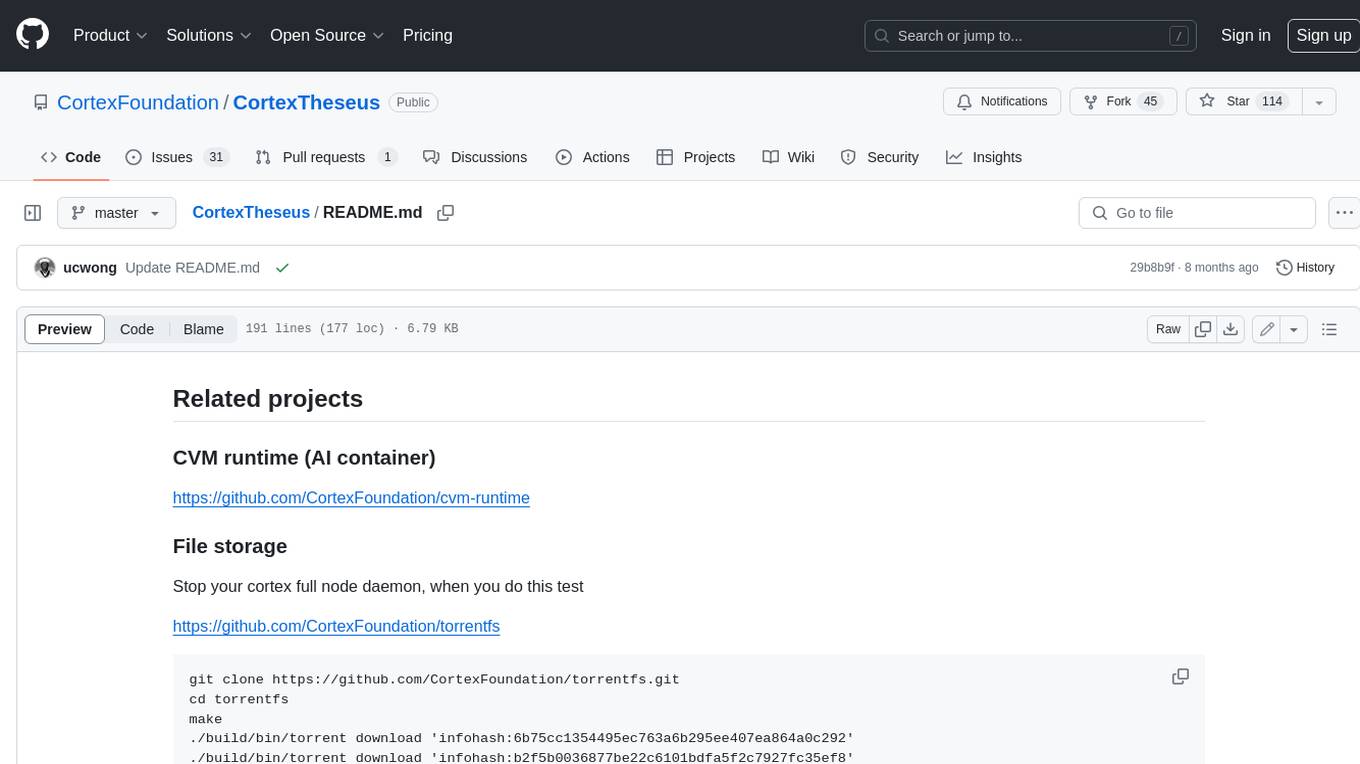
CortexTheseus
CortexTheseus is a full node implementation of the Cortex blockchain, written in C++. It provides a complete set of features for interacting with the Cortex network, including the ability to create and manage accounts, send and receive transactions, and participate in consensus. CortexTheseus is designed to be scalable, secure, and easy to use, making it an ideal choice for developers building applications on the Cortex blockchain.
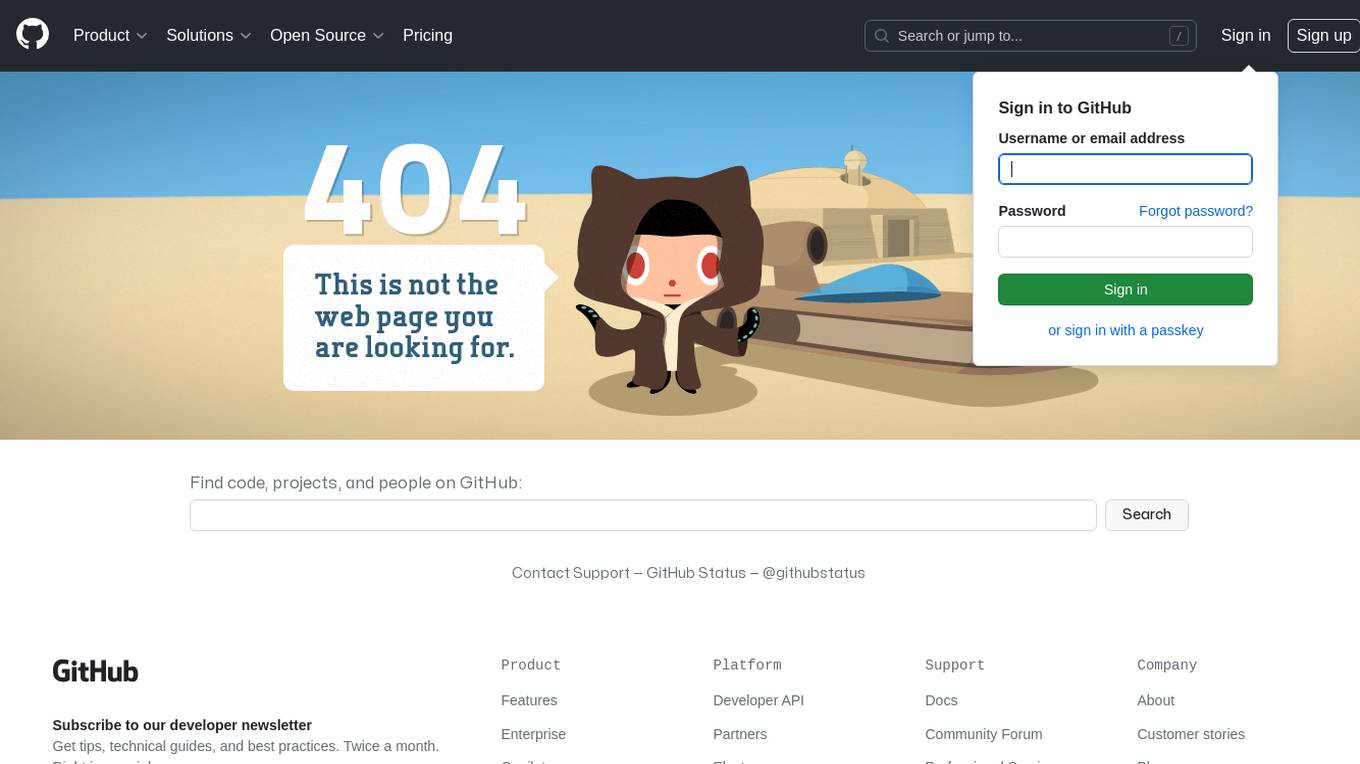
CHATPGT-MEV-BOT-ETH
This tool is a bot that monitors the performance of MEV transactions on the Ethereum blockchain. It provides real-time data on MEV profitability, transaction volume, and network congestion. The bot can be used to identify profitable MEV opportunities and to track the performance of MEV strategies.
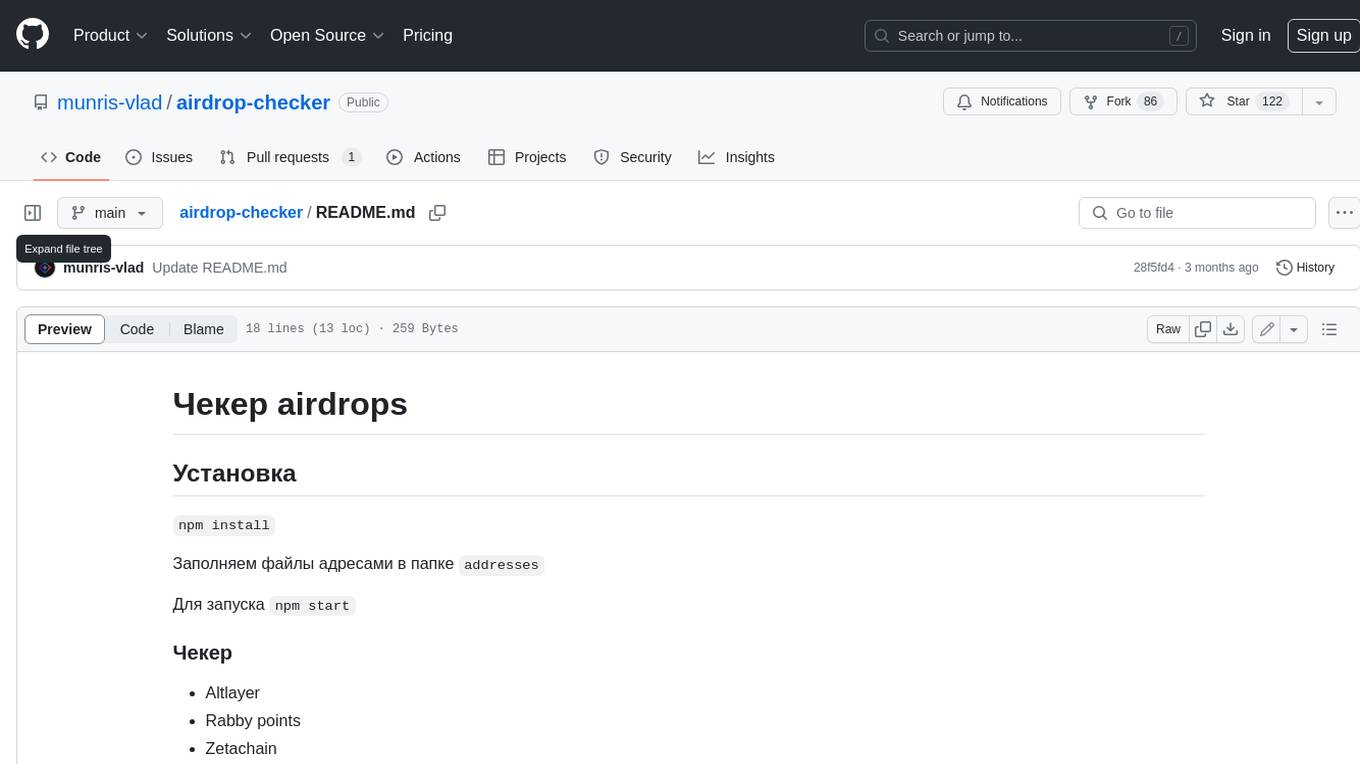
airdrop-checker
Airdrop-checker is a tool that helps you to check if you are eligible for any airdrops. It supports multiple airdrops, including Altlayer, Rabby points, Zetachain, Frame, Anoma, Dymension, and MEME. To use the tool, you need to install it using npm and then fill the addresses files in the addresses folder with your wallet addresses. Once you have done this, you can run the tool using npm start.